- Bahasa Indonesia
- မြန်မာဘာသာစကား


Can I change from a tourist visa to a working visa in Japan?
▲Is a question that some visitors to Japan may ask after experiencing what Japan has to offer. “I don’t want to leave Japan”, “I want to stay and work here”, are some other questions that come to mind. So the question now is, can you change from a tourist visa to a working visa in Japan?
First Published : 2021/07/13 Updated : 2024/04/18
Table of Contents
“Change of Status of Residence” Procedure in Japan
Can i change from a tourist visa to a working visa in japan , can i change from a working holiday visa to a working visa in japan .

In Japan, you are only permitted to engage in activities that are under your status of residence .
For example, international students cannot work as the 留学 (ryuugaku / study abroad) status is for studying only. If international students want to work, they need to get “ permission to engage in other activities other than that permitted under status of residence ”. If an international student wants to continue staying in Japan to work after graduating, he/she must change his/her 留学 visa to a 就労 (shuurou / working) visa. There are many different types of working visa in Japan , so you will need to change to one that matches your field of employment and job scope.
The relevant immigration procedure to change your visa type is called “Application for Change of Status of Residence”, aka 「在留資格変更許可申請 (zairyuu-shikaku henkou kyoka shinsei)」 . For more details, visit the Immigration Services Agency page here .
Note : A different procedure applies for “change to permanent residence”.
Starting from March 16 2022, “Application for Change of Status of Residence” procedures can be done online with a My Number Card . Read more about it here .
Writer's Pick

Feeling Blue in May? You’ve Got Japan’s May Blues, Gogatsubyo

Introducing Kumamoto Prefecture in Japan - What is it like in Kumamoto...

What is Kafunsho? Surviving Hay Fever in Japan

Japan Spring Flowers: When and Where to See Them

A Second Home: Interview with Filipinos Living & Working in Kumamoto,...

No, you cannot change from a tourist visa to a working visa in Japan. In the first place, job hunting while on a tourist visa is not permitted.
Previously, there were cases where a change from tourist visa to working visa was approved, provided a Certificate of Eligibility is able to be issued before the tourist visa period expires. However, since the end of 2019 , the immigration agency has become stricter and so this is no longer a viable option - exceptions are so rare that there’s no point trying it.
If you do manage to get a job offer while on a short-term visa, you will need to return to your home country first, and apply for a Certificate of Eligibility and work visa from there .

What is a working holiday visa? Based on bilateral agreements with partner countries and regions, the working holiday programme’s primary objective is to allow youths from Japan and other countries to spend their holidays in a foreign country whilst engaged in employment to supplement funds for their travel and stay . The aim is to deepen mutual understanding by providing opportunities to understand the culture and lifestyle of the destination country or region.
Depending on what country you are from, it is possible to change from a working holiday visa to a working visa in Japan. Some countries have a requirement that you must return to the country after your working holiday period expires. In this case, you cannot change from a working holiday visa to a working visa. These countries include:
- United Kingdom
and others.
Aside from those countries, it is possible for working holiday visa-holders from other countries to change from a working holiday visa to a working visa. Note that applications for change of status of residence are evaluated on a case-by-case basis so even if your application is rejected, it does not necessarily mean it is because you have a working holiday visa - other reasons may apply.
Please consult with your Embassy if you have any questions about a working holiday visa.

It is understandable why you would want to continue staying and working in Japan after experiencing life here as a visitor. However, are you sure you are ready to start a new life in Japan? Have you considered how different the work culture can be ? Or, if you have the Japanese language skills to support your life here?
Moving to another country is a huge step, so think carefully about it. And when you’re ready, Japan is always ready to welcome you.
Recommended Reading

Work and Travel in Japan with a Working Holiday Visa (2023)

Why do you want to work in Japan? Reasons to Start a Career in Japan
Related articles 関連記事.

19 Types of Working Visa in Japan

The Right Type of Visa for Engineer Jobs In Japan

What is a “Designated Activities Visa” in Japan? Types, and How to Use...

Think Innovatively: How to Apply for the Technical Intern Training Pro...

Moving in to Japan through Intra company transfer visa

Keiei-Kanri: What You Need to Know About Japan’s Business Manager Visa

Tokutei Ginou (特定技能), Japan’s Specified Skilled Worker (SSW) Visa
Features 特集.

17 Tokyo Sakura Spots for Cherry Blossom Viewing
Top articles 人気記事.

What is the average salary in Japan for foreigners? (2024)

Japan’s Work Culture: Things to Know Before Working in a Jap...

Kaichou, Shachou, etc. Company Positions and Job Titles in J...

Working Hours in a Typical Japanese Work Week
Why do you want to work in japan reasons to start a career....

Japanese Business Attire: Grooming and Workwear Standards in...
Japan’s work culture: things to know before working in a japanese comp..., kaichou, shachou, etc. company positions and job titles in japanese, japanese business attire: grooming and workwear standards in japanese..., our social media ソーシャルメディア.
Where we share the latest news about Japan in 9 languages!

Our YouTube channel brought to you from Shibuya! Don't miss our videos, covering everything from culture, entertainment, Japanese lessons, sightseeing, etc.
We share both useful and the latest information about Japan. Please give us a follow before coming to Japan!
Our WeXpats Team share their experiences and things they love in Japan. A must-check for people interested in the latest trends & the real side of Japan.
Fun videos covering Japanese lessons and relatable experiences in Japan. You can pick up many practical phrases and information you can't find in textbooks.
일본의 최신 뉴스 & 도움되는 정보를 전합니다. 일본에 오기 전에 꼭 팔로우해두세요!

Kênh YouTube từ thành phố Shibuya! Có rất nhiều video mà bạn không thể bỏ lỡ, chẳng hạn như tiếng Nhật, văn hóa, thông tin giải trí và địa điểm tham quan,v.v...
Chúng tôi chia sẻ những thông tin hữu ích và mới nhất về Nhật Bản. Hãy theo dõi chúng tôi trước khi đến Nhật Bản nhé!
Các video thú vị bao gồm các bài học tiếng Nhật và trải nghiệm thực tế ở Nhật Bản.Nơi chứa đầy những thông tin, kiến thức thực tế mà bạn không thể tìm thấy trong sách giáo khoa.
ဂျပန်နိုင်ငံ၏နောက်ဆုံးရသတင်းများနှင့်အသုံးဝင်မည့်အချက်အလက်များကိုတင်ဆက်ပေးပါမည်။ ဂျပန်နိုင်ငံသို့ မရောက်မီ ကျွန်ုပ်တို့pageကိုFollowလုပ်ပါ
Kami Berbagi informasi berguna dan terbaru tentang Jepang. Jadi Follow dulu sebelum kalian datang ke Jepang!
Tim WeXpats kami berbagi pengalaman dan hal-hal yang dialami di Jepang. Jadi orang-orang yang tertarik dengan tren terbaru dan sisi nyata dari Jepang harus banget Check!

起源於澀谷的YouTube頻道!日語、文化、娛樂情報、街頭訪問等等,各種影片不容錯過。
介紹日本最新資訊和實用情報。來日前請追蹤吧!
WeXpats團隊分享日本生活點滴。想了解最新潮流和真實的日本生活的人必看。
Le ofrecemos las últimas noticias e información útil sobre Japón. Asegúrese de seguirnos antes de venir a Japón!

Canal do Youtube direto do centro de Tóquio, no bairro de Shibuya! Não deixe de conferir nossos vídeos sobre cultura, entretenimento, lugares turísticos, aulas de japonês e muito mais!
Nós trazemos informações úteis e também as últimas tendências do Japão! Siga-nos para não perder nenhum detalhe!
เราแบ่งปันข้อมูลที่เป็นประโยชน์และข้อมูลล่าสุดเกี่ยวกับประเทศญี่ปุ่น เพื่อที่จะไม่พลาดข่าวสารสำคัญ อย่าลืมกดติดตามเราที่ WeXpats Thailand!
คลิปสนุกๆเกี่ยวกับภาษาญี่ปุ่น เรื่องแปลกๆในญี่ปุ่นและประโยคเด็ดที่คุณไม่สามารถหาได้จากหนังสือเรียน
Our website uses Cookies with the goal of improving our accessibility and quality. Please click "Agree" if you agree to our usage of Cookies. To see more details about how our company uses Cookies, please take a look here.
- Application
- Requirements

How to Work in Japan Legally: Japanese Work Visas and Eligibility
With a highly developed free-market economy and the third-largest nominal GDP in the world, it’s easy to see why Japan is an attractive destination for workers who want to relocate abroad.
Increasingly more international professionals are deciding to make the move to Japan to work: in 2018, over 1.4 million foreigners were working in Japan — a 14.2 % increase from the previous year.
This surge is not only due to economic growth and an overall improvement in employment conditions but also to the fact that the Japanese government has implemented strategies and policies to encourage highly-skilled foreign labor .
Part of this plan is the launch of new Japanese work visas for foreign nationals sponsored by local companies. Eligible workers who meet the work visa requirements (including a Japanese language test) are now able to apply for 2 different new types of visas depending on their specific circumstances.
The new working visas join the existing list of Japanese visas for professionals allowing skilled worker categories and business people to work in the country .
What Are the Japanese Work Visa Available?
There are several options available to get a work visa for Japan . The applicant’s eligibility will depend on a series of factors such as:
- The country issuing the applicant’s passport
- The applicant’s qualifications and skills, including previous work experience
- Whether the applicant intends to bring business to Japan or work as an employee in a Japanese enterprise.
Although work visas may be made available with an online application in the future , it must be noted that the only travel authorization for Japan that can be obtained entirely online at the moment is the Japan eVisa for tourism purposes .
Currently, foreigners who wish to obtain a business or work visa will need to visit a Japanese embassy or consulate in person.
Invest in Japan: the Business Visas
Japanese business visas are designed for foreigners who wish to work and invest in the country. Eligible professionals include:
- Stockholders
- Company directors
- Deputy directors
- Technical officers
- Volunteers for non-governmental organizations
- Staff members of Diplomatic Missions, General Consulates, the United
- Nations Agencies and other international organizations.
These visas also include subcategories to match specifically the sector and type of project the applicant will be involved in while in Japan — for example, Diplomatic, Official, Media, Investor, etc.
Work in a Japanese Company with the Work Visas
There are 4 types of working visa categories to match the different employee profiles that the country needs at the moment. Regardless of the specific category that matches their skillset, applicants need to be hired by a Japanese company in order to obtain the visa.
The work visas are intended for a variety of professional profiles, including:
- Highly-skilled and specialized workers
- Professors and researchers
- Blue-collar employees working in industries with a high demand for labor such as catering, cleaning, construction, agriculture, and fishing
Some of these visa schemes are designed around a point-based system that evaluates the applicant’s academic achievements as well as their professional background.
It’s also possible, in some cases, for work visa holders to bring their families to Japan.
How Long Is a Work Visa in Japan?
The Japanese work visas are long-term permits that allow foreign citizens to live and work in Japan for an extensive period of time — from three months to five years depending on the circumstances. There’s also the opportunity for renewal.
The validity of a Japanese business visa is 90 days . During this time, the business visa holder can enter and leave the country multiple times.
How Can I Get a Working Visa for Japan?
In order to be eligible for a work visa for Japan , you’ll need to meet the conditions to obtain a Status of Residence (SOR) that permits employment within the country.
Of course, the application process varies on a case-by-case basis and it’s heavily affected by the applicant’s specific circumstances. However, foreigners who wish to legally work as employees in Japan can generally take the following steps :
- Approach a Japanese company that can act as a visa sponsor and is willing to hire the applicant. Usually, all work visas require sponsorship.
- Identify the right type of visa that matches the applicant’s skills and circumstances.
- Check the work visa requirements and obtain the necessary documentation. The sponsoring entity will be able to assist.
- Visit the nearest Japanese embassy or consulate to start the application in person. The applicant will need to submit paper copies of the required documentation (such as passport, recent photographs, letter of guarantee, etc.) and pay the relevant application fee. The cost of a work visa for Japan varies and the embassy or consulate will be able to provide detailed information.
The processing time varies depending on the Japan visa type as well as the applicant’s situation. The extension of the e-Visa program to work permits is expected to make the application smoother and faster.
Can I Work in Japan without a Visa?
It’s illegal to work without an appropriate visa in Japan and doing so may expose you to serious consequences.
Even if you’re legally in the country with another visa (for example, a tourist visa or other short-term travel authorization), performing work on Japanese soil would break the conditions and requirements of your visa .
Not only this means that your visa will be canceled but you may face fines, deportation, and even detention. Moreover, breaking the law may prevent you from applying for a Japanese visa in the future.
It’s also worth noticing that many countries ask for the applicant’s history of visa rejection or cancelation in their visa application forms . In other words, you may be asked in the future whether one of your visa applications has ever been rejected. This means that not respecting the Japanese migration policy and having your visa canceled may be taken into account by other nations when you’re applying for visas in the future.
If you intend to work in Japan but are unsure about your eligibility or are already in the country on another visa, you can contact the Japanese authorities (your nearest embassy or a Japanese migration office) to explore your options.
Latest news about Japan Entry Visas

Traveling to Tokyo city: Japan’s Vibrant Capital

Osaka and Tokyo: Are they both worth visiting?

Japan Launches New Work Visas to Solve Labor Shortage
We’re sorry, this site is currently experiencing technical difficulties. Please try again in a few moments. Exception: request blocked
Japan Working Visas
- Published on : 24/12/2012
- by : Japan Experience
- Add to favorites
Japan working visas: find information on the requirements and procedures for applying for a Japanese work visa.
Work Visas for Japan
Specified skilled visas.
- Work Visa Requirements
- Working Holidays
Spouse Visas
Permanent residency.
Foreign Embassies & Consulates in Japan
- General Visa Information
- Living in Japan
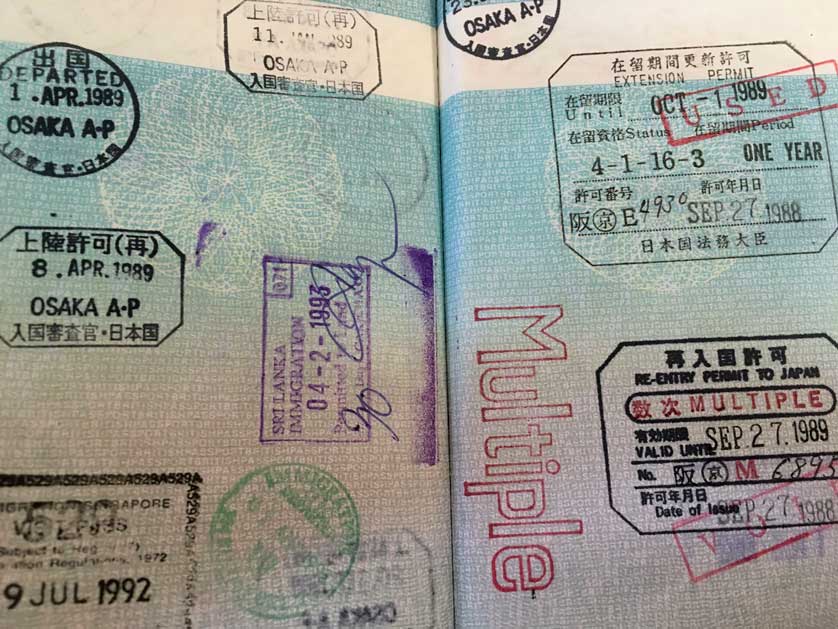
Working Visas
Visitors to Japan on a 3-month tourist visa are not allowed to work in Japan .
People hoping to find employment in Japan must have a working visa before they arrive in the country. Applying for one will require the cooperation of the the company, university, research institute, board of education or school that will employ them.
Applicants will need to liaise in this process with the Japanese embassy or consulate in their own countries.

From April 1, 2019 the Japanese government introduced new visas known as Specified Skilled Visas ( tokutei ginou , 特定技能) to address labor shortages in various industries.
Over 345,000 foreign workers will be allowed to enter Japan under the new conditions.
Two types of visa are available Specified Skills Visa 1- SSV1 and Specified Skills Visa 2- SSV2 .
The SSV1 will be for a period of five years and will allow for limited renewals. Entrants will NOT be allowed to bring family members.
The SSV2 (beginning in 2021) allows holders of this visa to bring family members and can be renewed indefinitely.
Holders of the SSV1 can apply to change their visa status to the SSV2.
Read more on Specified Skilled Visas .
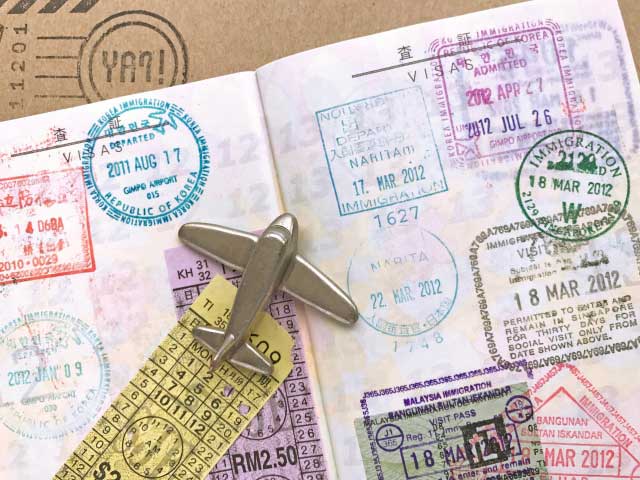
Working Visa Requirements
Visas which allow paid work generally require a Japanese company, school, university or individual to act as sponsor.
Having found work at a school, university or Japanese company, applicants for a working visa will need to fill out an application form from the Japanese embassy or consulate in their own countries.
The following are the usual requirements for obtaining a working visa for Japan: a valid passport, a recent photograph, a letter from your future employer (or sponsor) stating your position and expected salary, a Certificate of Eligibility (the application for which requires documentation from your prospective employer), a curriculum vitae and copies of any necessary graduation certificates.
The Certificate of Eligibility is a vital component of your working visa application. It is issued by the Japanese Ministry of Justice. If the candidate is overseas, the application for it will usually be made by the prospective employer through an immigration office in Japan. See Certificate of Eligibility application details .
Working visas are normally granted for periods of 1 year or 3 years except for entertainers where the periods are 3 months, 6 months and one year and are usually extendable.
Working visas are available in the following categories:
- Investor/Business Manager
- Legal/Accounting Services
- Medical Services
- Skilled Laborer (chef, sommelier etc)
- Specialist in Humanities/International Services
- Intra-Company Transferee
- Entertainer.
Visiting musicians and accompanying technical staff coming to Japan to perform at concerts for a limited period need a Certificate of Eligibility in order to obtain a working visa. Sportsmen and women competing in international competition in Japan, actors and classical musicians who are part of orchestras and are invited to perform in Japan may not have to provide a Certificate of Eligibility in order to obtain a visa.
JET Program
Participants on the Japanese government's JET (Japan Exchange & Teaching) Program will be issued visas as Instructor, in the case of Assistant Language Teachers (ALTs) or as Specialist in Humanities/International Services in the case of Coordinators for International Relations (CIRs). The JET Desk or JET Coordinator at the Embassy or Consulate General of Japan where you were interviewed for your job in Japan will provide you with the necessary documents to apply for a working visa for Japan. The Japan Exchange and Teaching (JET) Programme
Working Holiday Visas
Japan has mutual working holiday visa agreements with Australia, Canada, Denmark, France, Germany, Hong Kong, Ireland, The Republic of Korea, New Zealand, Norway and the United Kingdom. There is a similar but separate arrangement for Taiwan administered by the Interchange Association Japan (IAJ; 交通協会). Young people normally between the ages of 18-25 (sometimes 30 with the agreement of the immigration office) may work part-time during a one-year stay in Japan.
Read more about Working Holidays on Nakanoshima (Ama-cho) in the Oki Islands, Shimane Prefecture.
Non-Japanese nationals married to a Japanese national or permanent resident of Japan may apply for a spouse (haigusha; 配偶者) visa and engage in paid work while in Japan. A spouse visa is normally renewable after three years. This right may be rescinded in the case of Divorce .
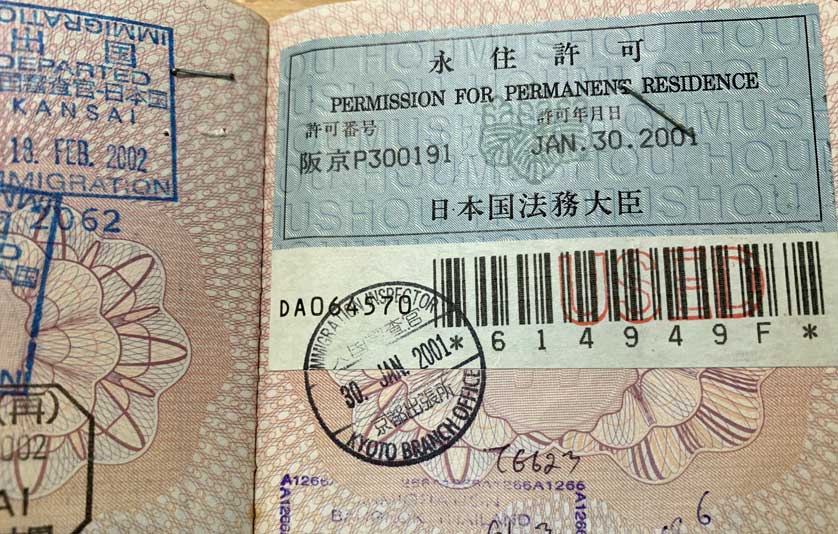
Long-term residents (typically people who have lived in Japan for more than 10 years, or less for people with Japanese ancestry or a Japanese spouse) may apply for permanent residency (eijyuken; 永住権) at their local immigration office. Permanent residency is indefinite and allows any paid-for work or employment. Nevertheless, permanent residents still require a re-entry permit for the purpose of re-entering Japan after trips abroad.
See our Japan residents section for further information on living and working in Japan .
Books on Japan Travel
Latest articles.
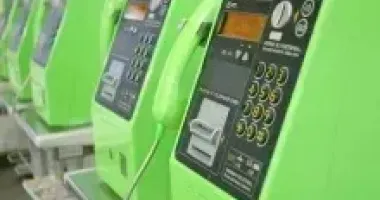
Japan Area Code: Everything You Need to Know About Calling Japan
Japan is a crucial destination for both business and tourism, attracting visitors from all over the world.

Understanding Electricity and Voltage in Japan for Travelers
Traveling to Japan is an exciting adventure, but it requires some practical preparation to ensure a smooth trip.

When to visit Japan to see the cherry blossoms?
The ever-popular blossoming of cherry flowers, Sakura , is a national event in Japan. However, the transience of flowers and unpredictability of the nature make forecasting difficult.
All the themes of the city

Travelling in Japan: a comprehensive guide

Japanese Food and Drink

Books on Japan

Japanese Movies

Japanese Language

Japanese History

Understanding Japan
Please select your country on the list below:
- Switzerland
- United Kingdom
- Other countries

- Intensive Japanese Courses
- Lite Intensive Japanese Courses
- Part-time Japanese Classes
- Private Lessons
- JLPT Prep Courses
- Online Japanese Lessons
- JLPT Online Instruction & Exercise – 6 Month Course
- Self-Study Courses
- About Coto Japanese Academy
- Iidabashi Japanese Language School
- Shibuya Japanese Language School
- Yokohama Japanese Language School
- Minato Japanese Language School
- Our Teaching Philosophy
- Student Visa Support
- Meet the Coto Team
- Corporate Solutions
- Japanese Blog
- All articles
Japan Work Visa Requirements – How to Get a Working Visa in Japan

Work visas in Japan require a bachelors usually, there are several different types of Japanese work visas.
Japan is a popular destination for foreign workers, due to its strong economy and high quality of life. However, the process of obtaining a Japanese work visa can be complex and time-consuming. This article will provide you with a comprehensive overview of the Japan work visa requirements and how to apply for one.
Types of Japanese Work Visas
There are several different types of Japanese work visas, each with its own unique requirements. The most common type of work visa is the Engineer/Specialist in Humanities/International Services visa. This visa is available to foreign workers who have a job offer from a Japanese employer and who have a bachelor’s degree or higher in a relevant field.
Other types of Japanese work visas include:
- Highly Skilled Professional Visa: This visa is available to foreign workers who have a job offer from a Japanese employer and who have a bachelor’s degree or higher in a relevant field, as well as a certain level of work experience and annual income.
- Instructor Visa: This visa is available to foreign workers who have a job offer from a Japanese educational institution and who will be teaching English or another foreign language.
- Medical Services Visa: This visa is available to foreign workers who have a job offer from a Japanese healthcare institution and who are a doctor, nurse, or other medical professional.
- Business Manager Visa: This visa is available to foreign workers who have a job offer from a Japanese company and who will be managing a business in Japan.
Requirements for a Japanese Work Visa
The general requirements for a Japanese work visa include:
- A valid passport
- A completed visa application form
- A passport-size photograph
- A Certificate of Eligibility (COE) issued by the Japanese Immigration Bureau
- A job offer from a Japanese employer
The COE is the most important document for a Japanese work visa application. It is issued by the Japanese Immigration Bureau after your employer has submitted a sponsorship application and you have passed a background check.
How to Apply for a Japanese Work Visa
To apply for a Japanese work visa, you must first contact a Japanese employer and obtain a job offer. Once you have a job offer, your employer will submit a sponsorship application to the Japanese Immigration Bureau. If the sponsorship application is approved, the Japanese Immigration Bureau will issue you a COE.
Once you have a COE, you can apply for a visa at the Japanese embassy or consulate in your home country. The visa application process will vary depending on the country where you are applying. However, in general, you will need to submit the following documents:
- Your passport
- A copy of your employment contract
- Proof of sufficient funds to support yourself during your stay in Japan
Can I study Japanese while on a work visa?
Yes, you can study Japanese while on a work visa. However, you will need to apply for a student visa if you want to attend a Japanese language school full-time.
Do I need a bachelor's degree for a Japan work visa?
A bachelor’s degree is required for most types of Japanese work visas. However, there are some exceptions, such as the Instructor Visa and the Medical Services Visa.
Where can I find the Japan work visa application forms?
The Japan work visa application forms can be found on the website of the Japan Ministry of Foreign Affairs: https://www.mofa.go.jp/files/000124525.pdf
Tips for Applying for a Japanese Work Visa
- Start planning early. The process of applying for a Japanese work visa can take several months, so it is important to start planning early.
- Gather all of the required documents in advance. This will help to ensure that your application is processed quickly and efficiently.
- Review your application carefully before submitting it. Make sure that all of the information is complete and accurate.
- Be prepared to answer questions about your job offer and your plans for your stay in Japan.
Applying for a Japanese work visa can be a complex process, but it is important to be patient and persistent. By following the steps outlined in this article, you can increase your chances of success.
If you have any further questions about the Japanese work visa application process, you should contact the Japanese embassy or consulate in your home country.
Test your Japanese level!
Recent Articles

Japanese Language & Cultural Immersion Course: Learn and Experience Japan

Start Learning Japanese With Coto Online Today, Available 24/7

Making Friends In Japan

Master Japanese In 4 Weeks With Intensive Japanese Course

Best Japanese Anki Decks: Easy ways to remember Japanese

The world's largest expat community
A Guide to Visa Types and Work Permits in Japan
Connect with fellow expats in Japan
Join exciting events and groups for expats
Get information in our expat guides
Exchange tips about expat life in Japan

Tokyo has so much to offer and InterNations made it much easier to become acclimated to life in this bustling city.
If you are coming to the Land of the Rising Sun for anything other than tourism, one of the main requirements to apply for a Japan visa is the Certificate of Eligibility (COE). This certificate is the first step in the Japan visa and application process because it states that the applicant is legally able to come to Japan—whether that be for work, family, or another qualifying reason. You will need to apply for and receive this certificate before arriving in Japan. Likewise, despite what you may expect, you will start the process of applying for your Japanese residence card (“green card”) at the airport when you first arrive in the island country.
The cost of Japanese visas stays relatively the same no matter the type of visa you are applying for. The price changes dependent only if you prefer a single or multiple entry visa. Likewise, Japan visa requirements all largely demand a university degree and COE, but depending on the type of work you will be doing you may need to submit a portfolio of work or other supporting materials.
Those interested in permanent residency will need to look into Japan’s immigration point system. This system scores applicants based on their academic achievements, work experience, and other qualifying factors. Expats who score high have a better chance of qualifying for permanent residence in as soon as one to five years.

Connect with like-minded expatriates
Discover our welcoming community of expats! You’ll find many ways to network, socialize, and make new friends. Attend online and in-person events that bring global minds together.
An amazing community is waiting for you!

Meet internacional people at local events

Socialize, enjoy hobbies, and make friends

Get info, and feel at home abroad!
Work Permits and Employment-Based Visas
The type of work permit or employment visa you need in Japan will be dependent on the type of work that you do. Japan has nearly 30 different work and long-term visas for expats to apply for based on their job and reason for moving to Japan.
Types of Work Visas You can Apply for
- Business manager
- Engineer/specialist in humanities/international services
- Entertainer
- Intra-company transferee
- Legal/accounting services
- Medical services
- Nursing care
- Religious activities
- Skilled labor
- Technical intern training
The length of time each permit allows an expat to remain in Japan varies dependent both on the permit you are applying for and your individual needs and circumstances. For most permits listed above, the length of time can be anywhere from three months to one to five years. No work visa is valid for more than five years.
Specified Skilled Worker Visa
In addition to the above work visa categories, Japan’s government also recently introduced the specified skills visa ( tokutei ginou , 特定技能). Split into two types, this visa is meant to encourage foreign workers to come to Japan and fill employment gaps in certain labor sectors. In total, the government hopes this visa will attract around 500,000 new foreign workers to Japan by 2025.
Specified Skills Visa 1-SSV1
Applicants applying for this visa must pass a Japanese language test as well as technical exams. Your level of Japanese proficiency will depend upon the job you will be working, but you may be required to pass up to an N4 level.
Skilled workers applying for this visa will work in the following areas:
- agriculture
- materials processing
- nursing care
- shipbuilding
- restaurants
- airport ground handling and aircraft maintenance
- food and beverage
- industrial machinery
- electronics and electric machinery
- building cleaning
- construction
- vehicle maintenance
This visa is only valid for one year and renewable for up to five years. Workers are not able to bring their families with them. If a worker wants to remain in Japan for longer than five years or wants their family to join them, they can apply for the Visa 2-SSV2.
Specified Skills Visa 2-SSV2
Unlike the Visa 1-SSV1, this visa can be renewed indefinitely and visa holders may bring their family to Japan. Currently, workers living and working in Japan on Visa 1-SSV1 can apply for this visa only after achieving higher levels of specialization in their field.
Japan Work Visa Requirements
While specific requirements may fluctuate from visa to visa, these are the general requirements you will need when applying for a work permit in Japan:
- an offer of employment from a Japanese company
- your passport
- visa application form
Certificate of Eligibility
Given the type of visa you are applying for, you may also need to provide a CV and your original university degrees or certificates.
The Certificate of Eligibility is an important document when applying for any Japanese work visa. This certificate is issued by the Immigration Services Agency of Japan. You can submit this form either in person at a Japanese consulate or embassy in another country, or you can mail it.
Requirements to submit the certificate include:
- completed application form;
- passport-sized photograph;
- filled out and stamped return envelope.
You will also be asked for extra documentation dependent on the type of work visa you are applying for. For example, those applying for a researcher visa will be asked to provide the following:
- material showing the outline of the recipient organization
- diploma, CV, and other documents certifying your career position
- documentation certifying the activity, its duration, position, and remuneration
Engineers will need to show:
- copies of the company registration and a statement of profit and loss of the recipient organization;
- materials showing the business substance of the recipient organization;
- diploma or a certificate of graduation with a major in the subject regarding the activity for the visa being applied for;
- documents certifying your professional career;
- documents certifying the activity, its duration, position, and the remuneration.
For a complete list of documents required for each Japan work permit visa application form, see the government’s website.
In some cases, the work visa can be issued without the Certificate of Eligibility, but an applicant may have to provide extra paperwork and the processing time could take longer. In other cases, a visa cannot be issued without this certificate. Either way, it is best that applicants obtain this certificate. The only expats who are able to receive a visa swiftly without a Certificate of Eligibility are intra-company transferees who work for stock exchange-listed companies.
Japan Visa Cost
The cost for a work visa in Japan depends both on the type of visa you are applying for, your nationality, and whether you want a single- or multiple-entry. A single-entry visa means that you must consult immigration officials (and may be subject to a fee) every time you wish to leave and re-enter Japan. A multiple-entry means you may come and go as you please.
In general, a single-entry visa will be about 3,000 JPY (30 USD). A multiple-entry visa is 6,000 JPY (60 USD).
Other Visas
If you are interested in a business visa or family visa, you can read more about them in the sections below. Business visas are the same as self-employment visas . Family visas are also called dependent visas.
Self-Employment Visas
Expats interested in a self-employment visa in Japan will need to apply for an investor or business visa. This is a self-sponsorship visa for individuals interested in establishing their own business in Japan rather than working for a Japanese company.
While this type of visa and work opportunity does provide for greater flexibility when living in Japan, the visa application process is difficult. Japan has a strong work culture with employees remaining loyal to one company throughout their entire careers, and employees are often seen as extended family members. Expats interested in being self-employed in Japan should prepare themselves for a difficult road as well as an assumed Japanese societal assumption that they are not serious, dedicated workers.
Japan Self-Employment Visas: Requirements
Because there is no self-employment visa in Japan, you will instead need to establish a business to support yourself. There are a few ways foreigners can do this. The first is by entering Japan on a work visa through a Japanese company, remaining in Japan for a year and building up a network to eventually start your business.
For some expats, this is an ideal way to become self-employed in Japan because many Japanese companies will sponsor your visa even if you only work contractually for them. It is also possible to start your business this way and then apply for an investor visa as someone who is starting a brand-new company in Japan.
If starting your own business from scratch, you will need to apply for the investor visa with the following:
- proof of a 500,000 JPY (4,600 USD) investment
- business plan
- copies of the company registration and a statement of profit and loss
- material showing the number of full-time staff (you will need at least one other full-time staff member in addition to yourself)
- copies of resident cards or registration certificate and documents regarding wage payments of the staff
- proof of an official business office
- proof of investment amounts
- your Japanese residence card
- proof you have paid regular income and residence tax
Another way to apply for an investor visa is by applying with a company that is already established. For a company to be considered already established, it will need to be at least three years old. You will then need to submit the following along with the application form, which can be found on the Japanese Ministry of Foreign Affairs website :
- proof that you earn at least 250,000 JPY (2,300 USD) per year (keep in mind that the more you earn, the better your chances are of getting the visa);
- monthly bank statements;
- invoices from previous clients;
- signed contracts from previous clients;
- proof of income tax contributions;
- official office address.
No matter which of the two investor options you decide to apply with, you will also need a university degree as well as any applicable certificates for the field in which you will be working.
Self-Employment Visa Cost
Just as with the other work visas, the cost of a self-sponsored business/investor visa will range between 3,000–6,000 JPY (30–60 USD) depending on whether you want a single- or multiple-entry visa.
Residency Permits: Temporary and Permanent
Knowing how to apply for a temporary or permanent residence visa in Japan first depends on how long you intend to stay. For short-term stays for tourism or business purposes, nationals of certain countries can enter Japan visa-free for anywhere between 15 to 90 days. You can find this complete list of countries on Japan’s Ministry of Foreign Affairs website.
The requirements and fees for a temporary resident permit vary depending on your nationality. For all nationalities, you will at least need to show your passport, arrival card, and customs declaration form (given to you in the plane; read more below) upon arrival into Japan. Many nationals from around the globe can arrive temporarily without paying a fee but check with your consulate to be sure. If you have to pay a fee, it should only be between 1,000 to 2,000 JPY (10–20 USD). For most expats, your application for a temporary residence permit will be made at the airport upon your arrival.
For some nationalities, it is possible to renew your short-term stay for an extra 90 days by either applying at a local government office or leaving Japan and immediately returning. However, for most expats wishing to live and work in Japan for longer than three months, you will need a long-term visa.
How to Obtain Residency in Japan
If you want to know how to get permanent residency in Japan, you will need to start by obtaining a long-term residency visa. To do this, you must start the application process before arriving in Japan. If you enter Japan on a tourist visa and take up employment, you will still need to leave the country and start the application from abroad. You cannot change a tourist visa to a long-term or working visa. However, once you have a long-term visa, it is possible to change or alter its status.
Step One: Certificate of Eligibility
If you have a job offer or are moving to Japan to study, your sponsor should take care of applying for the Certificate of Eligibility (COE) for you. This document serves as a preliminary screening process that says you are legally allowed to enter Japan. If you do not have a job offer nor are being sponsored by a school, it is still possible to obtain a COE. Take a look at the Immigration Services Agency of Japan’s website to see what category you may fall into and the documents required to apply for the COE.
Once you have the COE, you will take it to your closest Japanese consulate. Submit the COE along with your passport. Wait times will vary depending on your consulate. You will then receive an entry visa, which you will use when you enter Japan. This entry visa will have an expiry date, which is typically two months from the day you receive your passport back. This is the expiry date in which you need to enter Japan: meaning, you must enter Japan before this date or else the visa will be invalid.
Step Two: Residence Card
Unless you have a lot of time on your hands and want to set sail across the seas, you will arrive in Japan by plane (it is an island after all). On the plane, you will receive a landing card and a customs declaration form. If you do not, be sure to ask for one because these will be needed when going through customs.
These forms are standard. You will be asked to list:
- your contact information;
- passport number;
- origin of departure and final destination;
- address where you will be staying in Japan;
- intended length of stay;
- purpose of stay;
- any declared goods.
If you do not know the address of where you are staying, you can just list the city or the name of your hotel.
If you are arriving at one of Japan’s major airports, such as Narita, Haneda, Chubu, or Kansai, you will need to join a line that is separate from everyone else queueing for a visa on arrival. It is best to show your COE/entry visa to an airport staff member and have them direct you to the correct area. You will have your fingerprints and photograph taken, and then you will wait for your laminated residence card to be made right there in the airport.
Keep in mind, everyone entering Japan has their fingerprints and photograph taken for security purposes. If you do not receive a laminated card, that means you did not receive your residence card.
In Japan, a residence card is called a zairyu card (在留カード).
Step Three: Register Your Residence
Once you have arrived in Japan, you will have two weeks to register your residence with the local city hall. You will need to do this in the same municipality in which you live, so finding a place to live immediately upon arrival is imperative. However, it is also possible to change your address on your residence card when you move, so registering with a temporary residence is also an option.
When you register, you will do so with the residence card you received at the airport and your passport. The process should take less than an hour.
Once you have completed these steps, you should be issued your long-term visa. For nearly every expat, this visa will need to be tied to a form of employment or as a dependent/family member of a Japanese resident. The length of stay will depend on the visa type, but most will be for somewhere between one to five years.
Long-Term Visa Fee
Your visa fee will depend on whether you want a single- or multiple-entry visa. Single-entry visas will cost 3,000 JPY (30 USD). Multiple-entry will be 6,000 JPY (60 USD).
How to Obtain Permanent Residency in Japan
In recent years, Japan has somewhat loosened its requirements for permanent residency. It used to be that foreigners could only apply for permanent residency status after ten years of continuous living in Japan. Now, expats can apply for permanent residence status as early as one to five years if they meet certain requirements.
These requirements are based on a point system. When completing an application for permanent residence in Japan, you will fill out a form that will score you based on several factors: your profession, years working in your profession, academic qualifications and work achievements, age, licenses and certificates you may hold, and salary. People with high scores will have doctorates, senior-level positions, and/or multiple years of work experience. You can also boost your score by proving knowledge of the Japanese language.
To qualify for permanent residency within one to five years of living in Japan, you will need to score a minimum of 70 points. Those with a score of 80 points or higher are eligible to obtain permanent residency after just one year.
Japan Permanent Resident Visa Requirements
While the length of time you must live in Japan varies based on each individual, these are the general requirements for anyone applying for permanent residence in Japan:
- proof of no criminal record while residing in Japan;
- satisfy the requirements of your current visa, whether that means you are still married or employed;
- proof of adequate financial means;
- proof that you have contributed to taxes and social security;
- certificate of residence;
- proof of income;
- original passport and a copy;
- residence card.
Permanent Resident Benefits Japan
One benefit of having permanent residence in Japan is no longer having the need to switch your visa status if you change jobs. You will also no longer be required to renew your visa, although you will still need to renew your residence card every seven years. For those looking to own property in Japan, it will also be easier to get a loan from a Japanese bank.
Spouse Visa
A spouse visa in Japan is the same as a dependent visa or a family visa. Dependent visas include children and other family members that residents can claim as dependents. Spouse visas can be used for both same-sex and opposite-sex couples.
The process to get a spouse visa in Japan is straightforward. Most of the documents required will be ones supporting the Japanese residence status of the sponsoring spouse. Once you have that, the applicant applying for the spousal visa will need the following:
- certificate of eligibility
- passport-sized photograph
- certified copy of family register
- marriage or birth certificate (if applying as a spouse or child)
The only additional cost included with this visa is a family register. This is usually not more than 500 JPY (7 USD).
There is no such thing as a fiancé visa in Japan.

See all upcoming events for expats in Japan
Our global partners.

In such a huge city, InterNations has created great events for expats to meet in Tokyo.
Communities in Japan
Like-minded expatriates in japan, americans in japan, brits in japan, indians in japan, french in japan, brazilians in japan, filipinos in japan, germans in japan, australians in japan, chinese in japan, canadians in japan, japan guide topics.
- Media & Industry
- Meetings & Events
- Select Language 简体中文 繁體中文(香港) 繁體中文(臺灣) India (English) Bahasa Indonesia 한국어 ภาษาไทย Tiếng Việt Singapore (English) Philippines (English) Malaysia (English) Australia/New Zealand (English) Français Deutsch Italiano Español United Kingdom (English) Nordic countries(English) Canada (English) Canada (Français) United States (English) Mexico (español) Português العربية Japan(日本語) Global (English)
- India (English)
- Bahasa Indonesia
- Singapore (English)
- Philippines (English)
- Malaysia (English)
- Australia/New Zealand (English)
- United Kingdom (English)
- Nordic countries(English)
- Canada (English)
- Canada (Français)
- United States (English)
- Mexico (español)
- Global (English)
- Fujiyoshida
- Shimonoseki
- Ishigaki Island
- Miyako Island
- Kerama Island
- Tokyo Island
- Koka & Shigaraki
- Hida Takayama
- Ginza, Nihonbashi
- Beppu & Yufuin (Onsen)
- Ginzan Onsen
- Nagasaki Islands

- Kumano Kodo
- Shikoku Karst
- Amami Oshima
- Hachimantai
- Omihachiman
- Aizuwakamatsu

- Diving in Japan
- Skiing in Japan
- Seasonal Flowers in Japan
- Sustainable Outdoors
- Off the Beaten Track in Japan
- Scenic Spots
- World Heritage
- Home Stays & Farm Stays

- Japanese Gardens
- Japanese Crafts
- Temple Stays
- Heritage Stays
- Festivals and Events
- Theater in Japan
- Japanese Tea Ceremony
- Cultural Experiences in Japan
- Culture in Japan

- Local Cuisine Eastern Japan
- Local Cuisine Western Japan
- Local Street Food
- Japan's Local Ekiben
- Japanese Whisky
- Vegetarian and Vegan Guide
- Sushi in Japan Guide
- Japanese Sake Breweries

- Art Museums
- Architecture
- Performing Arts
- Art Festivals
- Japanese Anime and Comics
- Japanese Ceramics
- Local Crafts

- Scenic Night Views
- Natural Wonders
- Theme Parks
- Samurai & Ninja
- Iconic Architecture

- Wellness Travel in Japan
- Japanese Ryokan Guide
- A Guide to Stargazing in Japan
- Relaxation in Japan
- Forest Bathing (Shinrin-yoku)

- Experiences in Japan
- Enjoy my Japan
- National Parks
- Japan's Local Treasures
- Japan Heritage
- Snow Like No Other
- Wonder Around Japan

- Visa Information
- Getting to Japan
- Airport Access
- COVID-19: Practical Information for Traveling to Japan
- Anime Tourism
- Countryside Stays
- Accessible Tourism
- Hokkaido Great Outdoors
- Scenic World Heritage in Tohoku
- Shikoku’s Nature and Traditions
- Southern Kyushu by Rail

- Traveling by Rail
- How to Travel by Train and Bus
- JR Rail Passes
- Scenic Railways
- Renting a Car
- Sustainable Travel in Japan
- Travel Brochures
- Useful Apps
- Online Reservation Sites
- Eco-friendly Accommodation
- Luxury Accommodations
- Traveling With a Disability
- Hands-free Travel
- How to Book a Certified Tour Guide
- Volunteer Guides
- Tourist Information Center

- Japanese Manners
- Spring in Japan
- Summer in Japan
- Autumn in Japan
- Winter in Japan
- Cherry Blossom Forecast
- Autumn Leaves Forecast

- Japan Visitor Hotline
- Travel Insurance in Japan
- Japan Safe Travel Information
- Accessibility in Japan
- Vegetarian Guide
- Muslim Travelers
- Safety Tips

- JAPAN Monthly Web Magazine
- Arts & Cultures
- Nature & Outdoor
- Festivals & Events
- Insider Blog
- Things to do
- Local Guides
- Food & drink
- Traditional
- Hokuriku Shinetsu

My Favorites
${v.desc | trunc(25)}
Planning a Trip to Japan?
Share your travel photos with us by hashtagging your images with #visitjapanjp
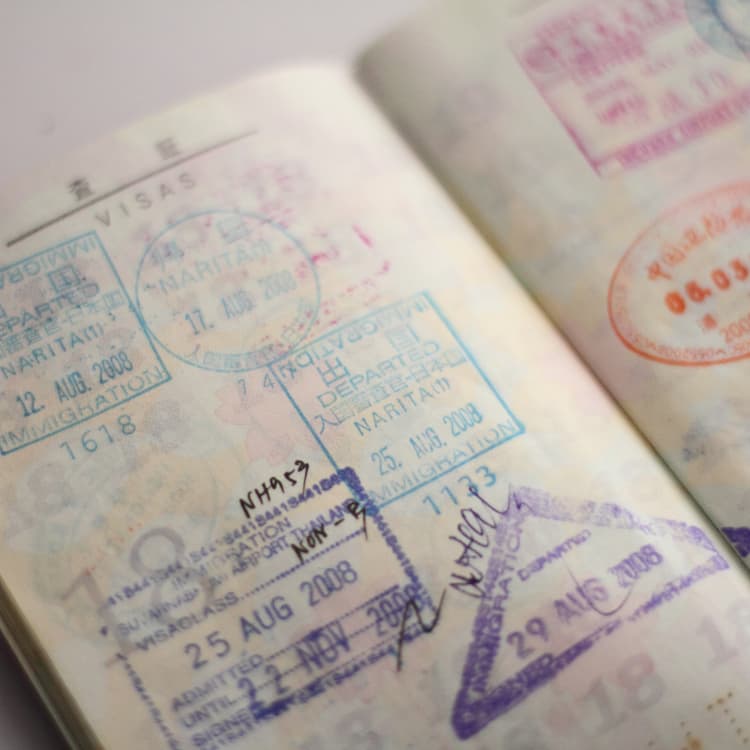
- Helping You Plan
All you need to know about entering, leaving and staying in Japan
Any foreign visitor entering Japan must have a valid passport for the duration of their stay, and all visitors must comply with the conditions of their visas.
See below for information about the current visa requirements for Japan.
If you have any further questions, please contact the Japanese embassy or consulate in your country of residence.
Enjoy the Digital Nomad Lifestyle in Japan
Japan introduced a new visa program specifically for "digital nomads" -international remote workers who are attracting worldwide attention.
Click here for details:
Did this information help you?
out of found this information helpful.
Thank you for your feedback.
Recommended for you.

Please Choose Your Language
Browse the JNTO site in one of multiple languages

What you need to know about getting a work visa in Japan
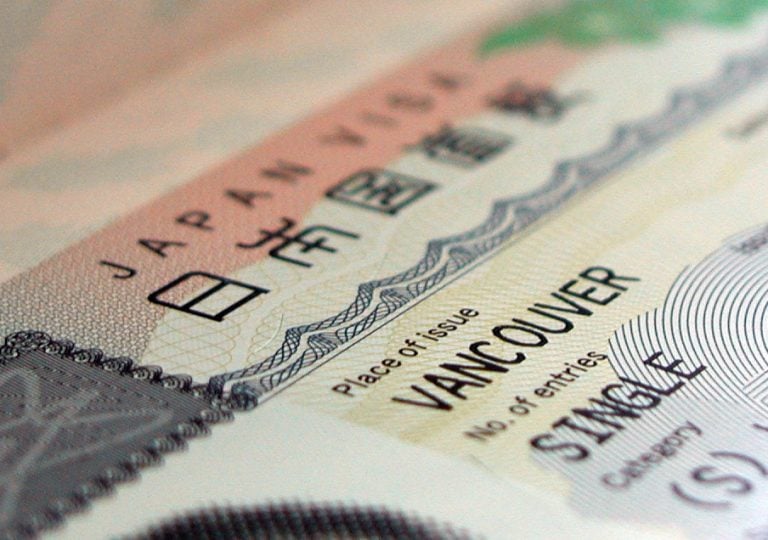
With around two million expatriates currently residing in Japan, the idea that Japan is closed to or very difficult for foreigners to find work is becoming more and more dated. With the right visa, there are many work opportunities in Japan. The right visa however is the key, as Japan’s visa system is somewhat bloated with bureaucracy and can be complicated for new arrivals, or even veterans of the system. The good news is that this is Japan after all, and so long as you follow the procedures correctly, things usually go fairly smoothly.
Today let’s have a look at these procedures, and answer some questions such as “What kind of Visa do I need for this job”, “Do I need a university degree for a visa in Japan” and more.

How to get your first Work Visa in Japan
It is often said that the first work visa is the hardest to get in Japan. This idea comes from the fact that more companies would rather hire someone who is in country, and already has a work visa, rather than go through the sponsorship process. Whilst this advice is still true, it is getting easier to find a position that will sponsor the first visa. The good news is that there are many inroads to a work visa in Japan, and changing work visa type is easier than starting from zero (more on work visa types later).
One of the most common first visa’s for people from English speaking countries is as an English teacher. English schools and public schools in Japan are constantly on the hunt for new English teachers, and such jobs that offer visa sponsorship are plenty. The Jet Programme is also another such inroad to a visa in Japan. However English teaching jobs are not the only route to your first work visa.

Take a look at the job postings on Jobs in Japan , many of the listings include visa sponsorship. At the time of writing, including “Visa” in the search keywords resulted in 63 job listings! Software Engineering jobs are increasingly being advertised with visa sponsorship, especially to those with experience.
Another common method to obtain a work visa in Japan is through your countries work holiday program. Whilst this visa type is not the best for long term employment, it takes the burden off an employer of having to sponsor your visa. With a work holiday visa you can start working straight away, and work whilst the sponsorship process proceeds, or whilst searching for a job in country. If you do go through this route, try to get onto a proper work Visa ASAP! This is because the tax rate on a work holiday visa is very high, at 20.42% with no deductions.

Types of Work Visas in Japan
Japan divides it work visa’s based on the type of employment that sponsors the visa. What this means is that if you are hired as a software engineer, you will receive a visa which allows you to work as a software engineer, but not as a chef. This is important to keep in mind. It is possible to change visa designations, but it is a relatively long process and you will not be allowed to work in the new position if your current work visa does not match. Let’s take a look at the types of work visa in Japan.
- Engineer/Specialist in humanities/International services (IT engineers, foreign language teachers in language schools, interpreters etc.)
- Instructor (teaching schoolchildren/ high school students in school)
- Professor (University)
- Business manager
- Legal/Accounting services (certified in Japan)
- Medical services (certified in Japan)
- Intra-company transferee (Examples: people transferred to the Japanese branch (head office of the same company, etc.)
- Entertainer
- Skilled labor
- Specified skilled worker (specific industrial fields)
- Technical intern training
- Religious activities
In addition to these work visas, there are other visas available to non-nationals of Japan that allow work. These include spouse visa, student visa (limited hours) and start up visa.
Visa Renewal
Work visas in Japan are issued as either 1 year, 3 years or 5 years. There doesn’t seem to be any rhythm to it, and anecdotal evidence suggests it is entirely up to the whim of the immigration officer. The renewal system is a fairly simple process, albeit tedious. So long as you are still with your employer or with a new employer in the same field, you are very likely to receive an extension.
In order to renew a work visa in japan, you must submit an application in person to the regional immigration office as per your address. The process will take two to four weeks, and then you will need to visit again to pay 4000 yen and receive your new visa. You can find the correct immigration office for your area on the official website for Japan immigration .
Seven Common Misconceptions and Questions about getting a Work Visa in Japan
I can come to Japan on a Tourist visa and find a job.
Technically you cannot change from a tourist visa to a work visa under Japanese immigration law. However, this law has so often been waived or ignored that anecdotal evidence suggests otherwise! Recent shifts however are leading to this law being enforced. There is a high risk that you will not be able to change from a tourist visa to a work visa going forward.
But can I switch from a tourist visa to a work visa?
In the past it was very common and likely, but this seems to have changed with the immigration bureaus upgrade to the immigration agency. Many employers that offer visa sponsorship will only accept applications from inside Japan. It therefore may seem easier to get a job by first getting in the country. The risk in this move however is that job hunting and applying for a job can take a long time. Additionally, you cannot open a bank account or get a proper phone number without a long term resident status. Job hunting without a stable internet connection for Skype interviews, or a proper telephone number for contacts can be difficult. Additionally, it takes a long period of time, especially around the main hiring period in Japan, for a work visa to process. You will not be able to start work until the visa is ready. Can you live without a wage for an extended period of time? And then after all that, there is a chance you will be told to return to your home country before the work visa can be processed.
I don’t need to worry about work visa’s whilst I am on a Working Holiday Visa.
This is true to the extent that a working holiday visa does not have any limitations except the adult industry. A working holiday visa is good for any field. There are a few serious downsides however. First, the tax rate is 20.42%, which can be a lot higher than the rate for usual first job level salaries. Working holiday visa tax is also calculated without deductions. Finally, some countries do not allow a transfer to a work visa from a working holiday visa.
I can work on a student visa.
Student visas do allow a limited amount of work in Japan. This amount of hours is capped at 28 hours per week, and this permission must be granted on the Visa separately.
Leaving Japan for a holiday or visiting home on a work visa is a tedious process.
As of 2012, you no longer need to apply for a re-entry permit when leaving the country. The process has been simplified, and you now only need to inform intent to reenter to an immigration officer at the airport. They will ensure your Visa remains valid by attaching a “Disembarkation card for reentrant” onto your passport.
I need a university degree to work in Japan.
Not having a university degree will be a massive hindrance toward any effort to find employment and obtain a work visa in Japan. Firstly, many positions will list a degree as a prerequisite. Secondly, it is the easiest way to meet the requirements for obtaining a work visa from immigration agency. It is not however the only way to meet those requirements. The immigration agency will also accept three years of professional work experience in lieu of an official degree. If you can find a position that doesn’t list a degree as a hard prerequisite, and you can demonstrate three years of professional experience, you can obtain a Japanese work visa without a university degree.
If I leave my job I also lose my Visa.
This is false. A Japanese work visa is valid until it expires, and you may continue working with it at another company, so long as the activities match. However, if you do leave a job, you are required to inform immigration. If you do not have a new job within three months, immigration has the right to revoke the visa. However, they may or may not do this. In my experience, if you are actively searching for a job in good faith, they will not revoke the visa.
If I leave my job but my Visa is still valid, I don’t need to contact immigration.
If you leave or lose a job, you are required to inform immigration. If you do not have a new job within three months, immigration has the right to revoke the visa. However, they may or may not do this. In my experience, if you are actively searching for a job in good faith, they will not revoke the visa prematurely.
I hope this article will help you on your journey to a working life in Japan!
Luke Jackson
Currently living the good life on my little farm in the mountains of Japan. I grow my own rice and vegetables, and try to avoid doing things I don't enjoy! I figure this is the best way to live life. I enjoy writing every day, sometimes songs, sometimes bedtime stories for my daughter, and sometimes articles about Japan. More articles by Luke Jackson
- How to Japan
- Company Spotlight
- Living in Japan
- Starting a Language School
Working in Japan
- Inside Japan Podcast
Recent Posts

Related Articles
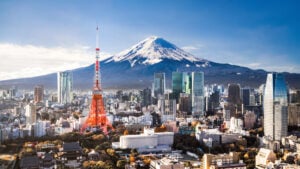
Kicking Off Your Career in Japan

Coronavirus Pandemic and Impact on Work in Japan
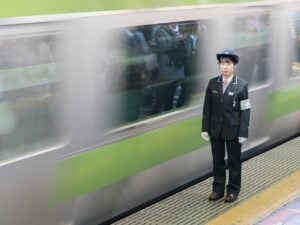
Working Overtime: Understanding and Navigating the Culture of Work in Japan
Related jobs.

Join Us in Gifu City! Seeking Passionate ALTs for Immediate Start

English Teacher Full time Childcare Staff – VISA Support Available

Children’s English Teacher (Akashi)

HR Planning Team Member (Use your Japanese skills – Enhance Your Corporate Skills)
President’s secretary and corporate planning office members jasdaq.

Restaurant Service Staff【OMH社】

Serious English Coaches Required (Online) – Immediate Start
English Language Coach (Online adult lessons only) – Expansion hiring New
Jobs In Japan
- Jobs in Japan
For Employers
- Users Guide
- Terms of Use
- Privacy Policy
- Commercial Act
Tokyo Office C/O Global Village Media 1-7-20-B2 Yaesu, Chuo-ku, Tokyo [email protected]

- How to – guides
- Skills List
- How to – guides
- North America
- South America
Work and Travel in Japan
Help us grow. share what you know about getting work in japan for travellers., volunteer and paid work opportunities in japan for travellers.
Many foreigners, hold a lifelong desire to travel to Japan, perhaps because the culture is so unique and exotic, especially for westerners. It has a reputation for being expensive and difficult for outsiders to assimilate into, so it’s best to be well-prepared before attempting to work and travel here. However, for those that are willing to push through the culture shock, the rewards for working and travelling in Japan can be great. Read on through our guide to making the most of your adventure in the Land of the Rising Sun. 1. Work in IT in Japan The tech field, of course, is constantly expanding and evolving, and Japan is a country often on the cutting-edge of technological advances. If you have good programming or software engineering skills, you can often find work without speaking much Japanese, which is generally a barrier to entry for many foreigners seeking work in Japan. 2. Teaching English at cram schools Teaching English as a native speaker is the most common position for foreigners looking to work and travel in Japan. The jobs often don’t pay very well, but backpackers can find work teaching at any time of year, and therefore is a great starting point for new arrivals looking to learn about Japanese culture. 3. Caregiving in an ageing home It is common knowledge that Japan has the highest proportion of elderly citizens of any country in the world. This has created a busy and booming market for elder care, since many young people in the big cities live in cramped apartments are too busy with work to keep their parents at home. If you enjoy working with older people, you don’t necessarily need any experience or even great Japanese language skills to start working in elder care in Japan.
VOLUNTEER WORK VISA / PERMIT REQUIREMENTS FOR JAPAN
Japan allows several nationalities from having to obtain a tourist visa before entering the country. Citizens from most European countries, United States, Australia, and Argentina do not need to get the Japan Tourist Visa since they are considered visa-exempt countries for tourism purposes. Nationals from any of those regions can stay in Japan for a maximum of 90 days visa-free and are assigned Temporary Visitor status. Under the single-entry regulation, tourists can remain in Japan for up to 30 days, but this tourist visa is valid for a period of up to 90 days. Tourists can also apply for a double-entry visa for 2 short trips within a 6-month period. An E-Visa option is upcoming, but has yet to be released, likely due to the pandemic. Citizens of China, Russia, the Phillippines, Vietnam and CIS countries will need a tourist visa sorted before entering the country.
SEASONAL BACKPACKER SKILLS NEEDED IN JAPAN
Spring work.
For being a relatively small, island-based country, Japan enjoys a wide variety of climates. Visitors are attracted not only to the cities but to mountain resorts and organic farms in small rural villages. Backpackers have their choice from a variety of beautiful locations when finding work in hospitality. Springtime is the best point in the year to find hospitality work, with many visitors coming over to witness the cherry blossoms but before western tourists start to arrive on summer vacation en masse. There are hotels alongside hot springs where you can volunteer in exchange for a bed, as well as hostels in the big city of Hokkaido where you can learn the art of running a hostel.
SUMMER JOBS
We recommend finding a work and travel opportunity at one of Japan’s many organic farms in the summer months. There are the usual fruit and vegetable farms, but also bee farms where honey is harvested, and terraced farms for rice. You’ll learn unique growing methods that will give you an edge back home if you decide to continue in the gardening or landscaping field. Just be aware that summers in Japan can be extremely hot, so you should be in good physical condition.
Many people say autumn is the best time of year to visit Japan, since the weather is at its most pleasant and mild. It’s a great time to join historical conservation projects in the country. You’ll have the option of working in far off temples or hosting groups that visit these sites. All you need to partake in these projects is an interest in history and a willingness to work.
Japan has proudly hosted the winter Olympics before, and it is clear to see why - the ski resorts are very popular. Backpackers can find work and travel opportunities at these places in Nagano, Niigata, and Yamagata prefecture, even if you don’t have any winter sports experience. How? Often au pairs are needed to watch after children, or chalet cleaners to keep the resorts clean.
ATTITUDE TO FOREIGNERS WORKING OR VOLUNTEERING IN JAPAN
Japan is an extremely modern country, with all the comforts of home and then some. You shouldn’t have any concerns about health issues or safety while working and travelling in Japan. The challenges for a foreigner in Japan come with understanding the nuances of social behaviour within the culture. As a westerner, it can be difficult to grasp the priority of “the group” over the individual. You must learn to respect these social constructs, however, or you will not be embraced by your employers. Some ex-pats complain that even after years of living in Japan and learning the language fluently, they never truly feel welcome. Japan is certainly an enticing and mysterious bucket-list country for working travellers. So the only question remains - are you ready to start planning your Japanese adventure?
Recent Contributors
- Edited on Jun 4 2021 by
If you have worked in Japan or live here. Instead of saying `That information is not right` Please sign up to Working Traveller by clicking here and update this page with your opinions on the subject and your views on what the barter points should be. If your a host, you will have a SEO link added to the page directly to your own web site so viewers can see who provided the information. If you are a traveller it will link to your profile.

- Fukuoka-shi
- Hiroshima-shi
- Yokohama-shi
- Fukuoka-ken
- Fukushima-ken
- Ibaraki-ken
- Ishikawa-ken
- Kanagawa-ken
- Kumamoto-ken
- Miyazaki-ken
- Nagasaki-ken
- Niigata-ken
- Okayama-ken
- Okinawa-ken
- Saitama-ken
- Shizuoka-ken
- Tochigi-ken
- Tottori-ken
- Wakayama-ken
- Yamagata-ken
- Yamaguchi-ken
- Yamanashi-ken
WORKING TRAVELLER LTD 27, Lonsdale Rd, Blackpool, FY1 6EE, UNITED KINGDOM
Work and travel the world using your skills to gain work experience and references for a good job back home
Log in with your credentials, forgot your details.
- Search Jobs Search Jobs
- Company List Company List
- Found a Job? 🎊 Found a Job? 🎊
For Employers
Get job alerts, how to live in japan and work remotely for an overseas employer [2024 guide].
Updated January 19, 2024

Japan Dev Team
Japan Dev contributor
- Career Development
In today’s digital world, working remotely is becoming increasingly commonplace. In fact, it’s the norm for many of us who work in tech, be it partially or full-time.
In previous posts, I talked about companies in Japan that hire candidates from overseas , allowing them to work remotely , but what about working for an overseas company while you’re living in Japan as a foreigner?
Certainly, there are visa types that allow you to work in Japan if you have a contract here, but coming to Japan just to work remotely falls under more of a grey area. To pull this off, you'll need to be a bit creative.
This is why many foreign professionals who want to stay in Japan for a while consider the working holiday visa . It doesn’t involve a limitation on work hours, and it doesn’t limit your field of work, either.
So, is the working holiday visa really the best way to go? Are there other visa types that might do the trick? I’ll answer all of these and more in today’s post.
First, let’s talk briefly about the distinct nature of the working holiday system.
In this article: 📝
All About Working Holiday Programs
Can i work remotely for a foreign company in japan with a working holiday visa, regarding taxes on foreign income while on a working holiday, other options to work remotely in japan for an overseas company, why work visas and the dependant visa won’t work, extending your stay on a working holiday visa, frequently asked questions on working remotely in japan.
Unlike other visa types that allow you to work in Japan as a foreigner, the working holiday visa is special in that it’s based on specific bilateral treaties between nations.
This means that the rules and regulations regarding the visa can change, depending on your country of origin and the specifics of the agreement it has made with Japan.
The working holiday treaties are created to allow young individuals to experience and learn about partner countries’ cultures, broadening their horizons. Simply put, they’re designed to grant individuals the right to stay and travel in Japan while working for a maximum of twelve months.
An important point to keep in mind is that this visa type is for young individuals, which means between the ages of 18 and 30 for most countries. For some countries, however, the eligibility age is capped at 26 or 25 years.
As a natural implication of the unique nature of working holiday programs, the working holiday visa may not be available to nationals of all countries, as they require the existence of a prior agreement.
To be more specific, Japan currently has working holiday agreements with 29 countries. Each year, new treaties are signed with new nations to extend this list even further. For instance, 2023 brought Uruguay, Finland, and Latvia to the steadily growing list.
To check which countries are added to the list and the specific requirements for nationals of specific countries, you can check the official working holiday programs page on the Ministry of Foreign Affairs website.
While it sounds good on paper at first glance, is the working holiday visa the perfect solution to working remotely in another country while staying in Japan?
Let’s dig deeper.
As I already mentioned, the working holiday visa, unlike a regular work visa, is designated to help you experience the country and its culture. This is the main objective of this visa, and the working part is only secondary.
In simpler terms, the main reason the working holiday visa exists is that it allows you to finance your travels yourself while you’re on holiday .
This means that even if there are no work-hour limits, unlike with the student visa which only allows you to work for a certain number of hours, you’re still obligated to put holiday first, and treat your job as a means to support yourself financially.
So, the “no work hour limitation” rule is actually limited by this requirement, and you’re supposed to only work part-time or do minor freelance work while you travel.
Speaking of limitations, another rule that limits the jobs you can work at is regarding jobs that may disrupt public morals, such as working at nightclubs.
All that being said, given that its main objective is to allow you to stay in Japan and travel/vacation, finding work isn’t among the working holiday visa requirements.
But if you choose to work remotely for a foreign company in Japan with a working holiday visa, there’s one big thing to consider – taxes.

A working holiday is part holiday and part working , enabling you to earn income. If you continue working remotely while on a working holiday visa instead of getting a mini job in Japan, the status of your earnings will be “foreign income.”
Naturally, this income will be subject to tax, however, it won’t be subject to your country of origin’s tax regulations. This is where it gets tricky.
During your stay in Japan, the authority responsible for taxing your earnings will be the Japanese Tax Authority. So, even if it’s possible to not get a part-time job in Japan and work remotely for your company, you’ll still face problems regarding your tax declarations.
As the visa granted to you isn’t a work visa, or a digital nomad visa which hasn’t yet been introduced, declaring your earnings from your job abroad will be quite tricky.
I’ll expand on this later below along with a few alternative solutions, but while we’re on the topic, here’s what you need to know about your tax responsibilities in Japan and your foreign income.
Taxes on Working Holiday and Foreign Income
Depending on whether you’re “selling labor”, i.e. you’re an employee, or working on a contractual basis as a freelancer, you’ll have to file differently.
If you’re providing paid labor as an employee, you will need to file an Article 172 Declaration the day before leaving Japan at the latest. You will be taxed at a rate of 20.42% on your earnings.
If you provide work on a contractual basis , i.e. as a freelancer, on the other hand, you’ll need to file a regular tax return in Japan. This means paying your taxes regularly as if you’re earning income in Japan.
In any case, your tax status depends heavily on your specific situation, so make sure to consult a professional accountant to be sure about your tax-related responsibilities.
Lastly, another point to keep in mind about taxes here is double taxation. If you are subject to double taxation in your home country, you may be able to receive “Foreign Tax Credit” (外国税額控除 / Gaikoku-zeigakukojo) for this, but this isn’t a guarantee and it can also be a bit of a hassle to get.
So, currently, it seems that those on a working holiday visa have to pay taxes in Japan in one way or another. Whether the introduction of a digital nomad visa will change this in the future is still up in the air.
The working holiday visa might not be what you’re looking for, but this isn’t to say that you’re out of options.
Those wondering, “Is there any way to work remotely in Japan for an overseas company using methods other than a working holiday visa?” should know that the answer is a yes . That said, these methods may prove to be trickier to deal with.
As I mentioned in my post on moving to Japan as a software developer , the main issue you’ll face is the visa. There are other options where this isn’t an issue, but they’re situational, like having a spousal visa.
While the working holiday visa can work for you with a few workarounds, you have to be careful when it comes to taxes. This is why, in some cases, it may be best to apply for a different type of visa to work in Japan for an overseas company.
Here are your options.
Short-Term Stay: The Tourist Visa is Remote Work-Friendly

If you plan on visiting Japan and continuing to work at your remote job during your stay, why not apply for a tourist visa instead? This is a common way to work while on vacation utilized by many foreign professionals.
Of course, a glaring downside of the tourist visa is that it allows for a much shorter stay, a maximum of 90 days, to be specific, whereas a working holiday visa allows staying up to a whole year. That said, this shorter stay ensures that you won’t have to deal with the Japanese tax system, as your earnings during your stay won’t be taxable by Japan’s tax authority.
The reason why working remotely while on a tourist visa is allowed is simple: it’s considered to be a temporary work activity that’s part of your work engagement abroad. As this is a part of daily life in today’s digital world and it’s normal for people to take care of business while on vacation, the tourist visa is perfect for you as long as you plan to stay less than 90 days.
Employer of Record Services (EORs): A Simple Workaround
If you’re a full-time employee in your country of origin and want to stay in Japan while continuing to work remotely, another option is using an EOR service.
Short for “Employer of Record”, EOR services act as a third party from Japan that employs you on your company’s behalf.
You can use a company like Deel to do this. Essentially, the company will provide you with an employment contract in Japan, and even sponsor your visa. To do this, you need to have good communication with your employer, seeing as your employer has to be the one who applies to the EOR company for this.
Alternatively, the EOR company can also hire you as a freelancer, and bill your original company of employment as well. In this case, you’ll have to handle taxes as a freelancer in Japan, so it will be the same basic process as with a work holiday visa.
The Intra-Company Transferee Visa
I have a detailed post on this already, but the intra-company transferee visa can be another good option that allows you to continue working remotely while you stay in Japan.
Essentially, this visa is issued to employees of overseas companies who are transferring to a Japanese office or branch of said company.
Of course, this visa is only an option if you’re an employee of a global company that has operations in Japan, such as large corporations like Google or Indeed . This may not be a reality for everyone, but if you play the long game, you may eventually end up in Japan.
If you want to find good global companies to work at that have offices in Japan, as well as ones that hire from overseas and offer visa sponsorship , you can always check Japan Dev where we post new job listings every day.
One important caveat to point out here is that the intra-company visa requires you to be employed at the company for at least a year before you can transfer, so, keep that in mind if you plan to pick this option.
Starting Your Own Company
If nothing else works, starting your own company and continuing to work for your company remotely as a freelancer or contract worker can allow you to stay in Japan. It’s a costly one, but an option nonetheless.
Most people don’t prefer this route because it’s not just expensive but also a bit of a hassle to deal with. Running a company requires accurate bookkeeping and a stronger comprehension of the tax system, which you’ll need an accountant for.
So, with all the responsibility and costs attached, this option seems to be only feasible if you’re willing to invest substantially to open the business (or branch) in Japan.
Student Visa
A student visa is another option that gets you residence in Japan, but, of course, this requires you to be enrolled in an official educational institution. It also requires you to be a full-time student.
The student visa does allow some part-time work, though. You need to apply for a special permit , which allows you to work for a maximum of 28 hours a week (40 hours during school vacation seasons).
While this visa isn’t for everyone, an important point to keep in mind if you pick this option is that you’ll be required to attend classes regularly. As you’re primarily a student, failing your student duties and missing too many classes will result in getting your visa revoked.
I’ve covered a wide range of possibilities and different visa types that can allow you to work remotely in Japan in one way, shape, or form. However, I didn’t mention the dependent visa that’s issued to spouses and the work visa for a reason.
For one, the dependent visa doesn’t recognize remote work from abroad as a relevant work activity, which puts it in an illegal territory. This means that you’ll have to apply for this non-qualified activity, which will only allow you to work 28 hours weekly at a maximum.
The dependent visa, as it is today, doesn’t allow for full-time work. This is because being dependent on someone is the primary requirement of this visa, which also means that your earnings can’t exceed your dependee’s.
Alternatively, a work visa is another non-option if you want to work remotely in Japan. Working for an overseas company isn’t a valid reason to qualify for a work visa, as your contract has to be with a public or private Japanese company/institution.
So, without a workplace in Japan, the Engineer/Humanities/International Services (技術・人文知識・国際業務)" and "Highly Skilled Professional (高度人材) visas aren’t an option for those looking to work remotely while staying in Japan.

The working holiday visa allows staying in Japan for up to a year, and, sadly, it can’t be extended .
It’s possible to cut your stay short and leave early, but staying longer than twelve months isn’t possible on a working holiday visa. You’ll have to leave before your visa expires and reapply for another visa if you want to reenter Japan.
Similarly, those who want to “convert” their working holiday visas to another type, such as the work visa, should also know that this, as a general rule, isn’t possible. Emphasis on the “general” here.
For one, a visa can’t be “converted” but you can apply for another visa should you cease to qualify for the one you’ve applied for or your status changes. This means that even if you get hired and sign a contract with a Japan-based company during your working holiday, you’ll have to apply for a work visa instead of “converting” your current visa.
So, as it stands, the general rule seems to be that if you do find a job that makes you qualified for a work visa, you’ll still have to leave Japan and apply from your country of origin.
That said, it’s important to keep the unique nature of the working holiday programs in mind, which stems from bilateral treaties signed between Japan and individual countries. What this means is that while there are general rules that govern these programs, the specific rules for each country depend on the bilateral treaty between the two countries.
So, depending on the agreements, there may be specific rules for nationals of certain countries that might allow them to apply for a work visa while on a working holiday, but as I said, this isn’t a guarantee and you should check the specific regulations for your country.
Before I go, I’d like to provide some quick answers to some of the biggest burning questions online regarding working holiday visas and working remotely during your stay in Japan.
Can I Live in Japan and Work For a US Company?
Yes, you can work remotely while you’re in Japan using an Employer of Record (EOR) service, or by obtaining an “intra-company transferee visa” if you’re eligible. Alternatively, you can start a company in Japan and work for your employer as a contractor, which may be costly.
Lastly, you can find a new job in Japan, at a subsidiary of a US-based corporation, which you can find plenty of on the Japan Dev company list .
Can I Work Remotely in Japan on a Working Holiday Visa?
Technically, yes, you can. However, what you need to be careful about is filing taxes and declaring your foreign income, given that your earnings will need to be taxed by the Japanese Tax Agency.
Can You Work Remotely While on a Tourist Visa in Japan?
Yes, you can. The tourist visa allows you a short-term stay in Japan, and the work you temporarily engage in as part of a work conducted abroad is allowed during your stay.
Can I Move to Japan With a Remote Job?
Yes, you can move to Japan while remaining employed at a remote job. However, it isn’t easy.
You can obtain a working holiday visa, but this is limited to one year, and you also need to be under 30 years old (under 25 or 26 for nationals of certain countries ). In addition to this, you can use an EOR service, which involves a 3rd party company employing you on behalf of your company.
If your employer is willing to be involved, instead of using an EOR service, your company can hire you as a freelance contractor for the term you stay in Japan. Lastly, if you have the resources, you also have the option to start your own company in Japan.
Of course, if you like Japan, looking for a full-time job while on a working holiday visa can be another option. You can find great opportunities on the Japan Dev job board where we feature jobs from companies with best practices, and some even allow remote work and don’t require any Japanese skills !
Can I Get a Full-Time Job in Japan on a Working Holiday Visa?
If you want to work for a company in Japan full-time while you’re in the country on a working holiday visa, you technically can, as this visa type doesn’t involve any work hour limitations.
That said, the main purpose of the working holiday visa is vacationing, and theoretically, you’re only supposed to be working to finance your travels. If you’ve found a full-time job in Japan, it’s recommended to apply to change your residence status to a more appropriate one, like the work visa types I explored in my How to get an Engineering Visa post.
References:
The Ministry of Foreign Affairs - The Working Holiday Programs in Japan
National Tax Agency: 2023 INCOME TAX AND SPECIAL INCOME TAX FOR RECONSTRUCTION GUIDE
Kamalegal: The Immigration Will Know You Work For More Than 28 Hours
Consulate General Japan in Hong Kong: Working Holiday Visa for Japan Q&A
This post was written by our Japan Dev editorial team.
- ¥5mil - ¥8.5mil
- ¥9mil - ¥11mil
- ¥5mil - ¥10mil
- ¥6mil - ¥10mil
Want to write for Japan Dev ? ✍️ 💙 Click here to learn how!
Latest Tech Jobs 🇯🇵
Explore the top developer jobs in Japan for foreigners
- ¥5mil - ¥8mil
Sign up for our newsletter to get hand-picked tech jobs in Japan – straight to your inbox.
Join 30k readers + get our Developer Salary Guide free ☝️

© 2024 Japan Dev. All rights reserved.
Proudly built in Tokyo.
- Python Jobs
- Backend Jobs
- Front-end Jobs
- Android Jobs
- Javascript Jobs
- Devops Jobs
- Full-stack Jobs
- Kotlin Jobs
- Machine Jobs
- Manager Jobs
- Design Jobs
Curated with 💙 in Tokyo
All our data is gathered from publicly available sources or contributed by users
Security Alert May 17, 2024
Worldwide caution, update may 10, 2024, information for u.s. citizens in the middle east.
- Travel Advisories |
- Contact Us |
- MyTravelGov |
Find U.S. Embassies & Consulates
Travel.state.gov, congressional liaison, special issuance agency, u.s. passports, international travel, intercountry adoption, international parental child abduction, records and authentications, popular links, travel advisories, mytravelgov, stay connected, legal resources, legal information, info for u.s. law enforcement, replace or certify documents.
Before You Go
Learn About Your Destination
While Abroad
Emergencies
Share this page:
Travel Advisory January 8, 2024
Japan - level 1: exercise normal precautions.
Japan – Level 1: Exercise Normal Precautions
Reissued after periodic review without changes.
Exercise normal precautions in Japan.
Read the country information page for additional information on travel to Japan.
If you decide to travel to Japan:
- Enroll in the Smart Traveler Enrollment Program (STEP) to receive Alerts and make it easier to locate you in an emergency.
- Follow the Department of State on Facebook and Twitter .
- Follow Embassy Tokyo’s American Citizen Services section on Facebook and Twitter .
- Review the Country Security Report for Japan.
- Visit the CDC page for the latest Travel Health Information related to your travel.
- Prepare a contingency plan for emergency situations. Review the Traveler’s Checklist .
Embassy Messages
View Alerts and Messages Archive
Quick Facts
Duration of intended period of stay. Please note you cannot travel on a passport you have previously declared as lost or stolen even if you subsequently locate it
One page required for entry stamp
Amounts equivalent to ¥1,000,000 or above subject to declaration
Embassies and Consulates
U.S. Embassy Tokyo 1-10-5 Akasaka, Minato-ku, Tokyo 107-8420 Japan Telephone: 81-3-3224-5000 Emergency After-Hours Telephone: 81-3-3224-5000 Fax: 81-3-3224-5856 Our Navigator Assistant will guide you to the information you need.
U.S. Consulate General Osaka-Kobe 2-11-5, Nishitenma, Kita-ku, Osaka 530-8543, Japan Telephone: 81-6-6315-5900 Emergency After-Hours Telephone: 81-3-3224-5000 Fax: 81-6-6315-5914 Our Navigator Assistant will guide you to the information you need.
U.S. Consulate General Naha 2-1-1 Toyama, Urasoe City, Okinawa, Japan Telephone: 81-98-876-4211 Emergency Telephone: 81-3-3224-5000 Fax: 81-98-876-4243 Our Navigator Assistant will guide you to the information you need.
U.S. Consulate General Sapporo Kita 1-jo Nishi 28-chome, Chuo-ku, Sapporo 064-0821, Japan Telephone: 81-11-641-1115 Emergency After-Hours Telephone: 81-11-641-1115 Fax: 81-11-643-1283 Our Navigator Assistant will guide you to the information you need. All assistance at the Consulate General Sapporo is by appointment only.
U.S. Consulate Fukuoka 5-26 Ohori 2-chome, Chuo-ku, Fukuoka 810-0052, Japan Telephone: 81-92-751-9331 Emergency After-Hours Telephone: 81-3-3224-5000 Fax: 81-92-713-9222 [email protected] Our Navigator Assistant will guide you to the information you need. Routine services are provided by appointment only.
U.S. Consulate Nagoya Nagoya International Center Bldg. 6th floor, 1-47-1 Nagono, Nakamura-ku, Nagoya 450-0001, Japan Telephone: 81-52-581-4501 Emergency After-Hours Telephone: 81-3-3224-5000 Fax: 81-52-581-3190 Our Navigator Assistant will guide you to the information you need. Emergency services are provided by U.S. Consulate General Osaka-Kobe.
Destination Description
See the Department of State’s Fact Sheet on Japan for information on U.S-Japan relations.
Entry, Exit and Visa Requirements
Visit the Embassy of Japan website for the most current visa information.
There are no COVID-related entry requirements for U.S. citizens.
Entry & Exit:
- You must have a valid passport and an onward/return ticket for tourist/business "visa free" stays of up to 90 days. Your passport must be valid for the entire time you are staying in Japan.
- You cannot work on a 90-day "visa free" entry.
- "Visa free" entry status may not be changed to another visa status without departing and then re-entering Japan with the appropriate visa, such as a spouse, work, or study visa.
- Visit the Embassy of Japan website for the most current information on all visa categories.
- Japanese immigration officers may deny you entry if you appear to have no visible means of support.
- All foreign nationals are required to provide fingerprint scans and to be photographed at the port of entry. Exceptions to this requirement include diplomatic and official visa holders, minors, and individuals covered under SOFA Article IX.2. For further information about landing procedures, please visit the Immigration Bureau of Japan’s website .
- Make sure your passport is valid. Note you cannot travel on a passport you have previously declared as lost or stolen even if you subsequently locate it. Japanese authorities will likely deny you entry into Japan if you attempt to do so. If you have reported your passport lost or stolen, you must apply for a new passport before travel.
Transiting Japan:
- Ensure that your passport and visa are valid and up-to-date before you leave the United States. Passport services are not available at the airport.
- Airlines in Japan may deny you boarding for transit if you do not have the required travel documents for an onward destination in another country or if your passport does not have six months of validity remaining. For the entry requirements of the country you are traveling to, visit the State Department's Country Specific Information website.
Military/SOFA Travelers: While active-duty U.S. military personnel may enter Japan under the Status of Forces Agreement (SOFA) with proper Department of Defense (DoD) identification and travel orders, all SOFA family members, civilian employees, and contractors must have valid passports to enter Japan. Please consult the DOD Foreign Clearance Guide before leaving the United States.
See the Immigration Bureau of Japan’s website for various immigration procedures.
HIV/AIDS Restrictions: The U.S. Department of State is unaware of any HIV/AIDS entry restrictions for visitors to or foreign residents of Japan.
Find information on dual nationality , prevention of international child abduction and customs regulations on our websites.
Safety and Security
For police services in Japan, dial 110. For fire or ambulance services, dial 119.
Crime: Crime against U.S. citizens in Japan is generally low and usually involves personal disputes, theft, or vandalism. In addition:
- Robberies committed after a victim has been drugged from a spiked drink can occur, especially in nightlife districts.
- Sexual assaults are not often reported, but they do occur, and victims may be randomly targeted. Victim's assistance resources or shelters are difficult for foreigners to access.
- Hate-related violent crimes rarely occur, although some U.S. citizens have reported being the target of discrimination because of their nationality or their race.
- Pick pocketing can occur in crowded shopping areas, on trains, and at airports.
- Police reports must be filed before leaving Japan, as Japanese police will not accept reports filed from overseas.
- In instances involving credit card theft or fraud, Japanese police often provide a report number rather than a police report. You can provide this report number to your credit card company to confirm the incident with the police.
Entertainment and Nightlife Districts in Tokyo:
- Exercise caution in all entertainment and nightlife districts throughout Japan, especially Roppongi, Kabuki-cho, Shibuya, and Ikebukuro.
- Incidents involving U.S. citizens in these areas include physical and sexual assaults, drug overdoses, theft of purses, wallets, cash and credit cards at bars or clubs, and drugs slipped into drinks.
- Drink spiking at bars and entertainment venues, especially in areas such as Roppongi and Kabuki-cho, near Shinjuku, has led to robbery, physical and sexual assaults, and credit card fraud. Some victims regain consciousness in the bar or club; other victims may awaken on the street or other unfamiliar locations.
- U.S. citizens have reported being threatened with gun or knife violence in such venues so that they will pay exorbitant bar tabs or withdraw money. U.S. citizens have also reported being beaten when they have refused to pay or hand over money.
- There have been reports of U.S. citizens being forcibly taken to ATMs and robbed, or made to withdraw funds after being unable to pay exorbitant bar tabs.
- Please be aware that Roppongi, Kabuki-cho, and other entertainment and nightlife districts have also been the scenes of violence between criminal syndicates.
See the Department of State and the FBI pages for information on scams.
Police reports must be filed at the nearest police station prior to departure from Japan. The Japanese police cannot accept reports filed from overseas. Report crimes to the local police at 110 and contact the U.S. Embassy at 03-3224-5000 (011-81-3-3224-5000 from overseas). Remember that local authorities are responsible for investigating and prosecuting the crime.
See our webpage on help for U.S. victims of crime overseas .
- help you find appropriate medical care;
- assist you in reporting a crime to the police;
- contact relatives or friends with your written consent;
- explain the local criminal justice process in general terms;
- provide a list of local attorneys;
- provide information on victim’s compensation programs in the U.S. ;
- provide an emergency loan for repatriation to the United States and/or limited medical support in cases of destitution
- help you find accommodation and arrange flights home; and/or
- replace a stolen or lost passport.
Contacting Police, Fire and Ambulance Services: You can reach the police throughout Japan by dialing 110. Fire and ambulance services can be contacted by dialing 119. Note that English-speaking dispatchers may not be available. Please review advice on “Calling for Help” on our website . If you need assistance, you should be able to describe your address/location in Japanese or find someone who can do so, since few police officers speak English.
Domestic Violence: Victim's assistance resources or battered women's shelters exist in major urban areas, but are difficult for foreigners to access. These types of resources are also generally unavailable in rural areas. Investigations of sexual assault crimes are often conducted without female police officers present, and police typically ask about the victim's sexual history and previous relationships.
Tourism: The Victim's assistance resources or battered women's shelters exist in major urban areas, but are difficult for foreigners to access. These types of resources are also generally unavailable in rural areas. Investigations of sexual assault crimes are often conducted without female police officers present, and police typically ask about the victim's sexual history and previous relationships.
See our webpage for more information on insurance providers for overseas coverage.
Local Laws & Special Circumstances
Criminal Penalties: You are subject to Japanese law while you are in Japan. If you violate Japanese laws, even unknowingly, you may be arrested, imprisoned, or deported. If you are arrested in Japan, even for a minor offense , you may be held in detention without bail for several months or more during the investigation and legal proceedings.
Some offences are also prosecutable in the United States, regardless of Japanese law. For examples, see our website on crimes against minors abroad and the Department of Justice website.
The vast majority of arrests of U.S. citizens in Japan are for drug-related offenses. Japanese authorities aggressively pursue drug smugglers and users, including recreational users with sophisticated detection equipment, "sniffing" dogs, blood tests, “stop and frisk” tactics, and other methods. Penalties for possessing, using, or trafficking a drug that is illegal in Japan are severe, and convicted offenders can expect long jail sentences and fines. Please note that some drugs which may be legal in certain jurisdictions outside of Japan, including marijuana and synthetic drugs, remain illegal in Japan. This also applies to certain prescription drugs that doctors in the United States may prescribe. Japanese law makes no distinction between medical and recreational marijuana; therefore, having a prescription for medical marijuana will not help you avoid arrest or prosecution. Even possession of a small amount of marijuana for personal medical or recreational use can result in a long jail sentence and fine. Japanese customs officials carefully screen incoming packages, and individuals who are mailed drugs can be arrested and prosecuted as drug traffickers.
Confiscation of Prescription Drugs and Other Medication: It is important to note that some medications that are routinely prescribed in the United States, including Adderall and marijuana, are strictly prohibited in Japan. The Japanese government decides which medications may be imported legally into Japan. The Embassy and Consulates of Japan in the United States have limited information available and do not have a comprehensive list of specific medications or ingredients. Please see more information on importing medicines into Japan.
You must carry your U.S. passport or Japanese Residence Card (Zairyu Kado) with you at all times. In Japan, you may be taken in for questioning if you do not have your passport or Japanese residence card to show your identity and status in Japan (e.g., as a visitor, student, worker, or permanent resident).
It is illegal to work in Japan while in tourist or visa-waiver status. Overstaying your visa or working illegally may lead to fines of several thousands of dollars, and in some cases, re-entry bans as long as 10 years, or indefinitely for drug offenders. For additional information, please see Japan’s Immigration Control and Refugee Recognition Act and contact the Japanese Embassy or nearest Japanese Consulate in the United States for more information.
Driving under the influence of alcohol could also land you immediately in jail. The blood-alcohol limit in Japan is 0.03%. Punishments can be up to 10,000 USD in fines and up to five years in prison.
Possession of a gun or ammunition is a crime in Japan. Carrying a knife with a locking blade, or a folding blade that is longer than 5.5 cm (a little more than two inches), is illegal in Japan. U.S. citizens and U.S. military personnel have been arrested and detained for more than 10 days for carrying pocket knives that are legal in the United States but illegal in Japan. The possession of lock-picking tools is illegal in Japan.
Establishing a Business : Individuals establishing a business or practicing a profession that requires additional permits or licensing should seek information from the competent local authorities, prior to practicing or operating a business.
A list of English-speaking lawyers located throughout Japan is available on our website .
Arrest Notification : If you are arrested or detained, ask police or prison officials to notify the U.S. Embassy immediately. See the Department of State’s webpage and the Embassy’s website for additional information.
Counterfeit and Pirated Goods: Although counterfeit and pirated goods are prevalent in many countries, they may still be illegal according to local laws. You may also pay fines or have to give them up if you bring them back to the United States. See the U.S. Department of Justice’s website for more information .
Faith-Based Travelers: See our following webpages for details:
- Faith-Based Travel Information
- International Religious Freedom Report – see country reports
- Human Rights Report – see country reports
- Hajj Fact Sheet for Travelers
- Best Practices for Volunteering Abroad
LGBTQI+ Travelers: There are no legal restrictions on same-sex sexual relations or the organization of LGBTI+ events in Japan.
Laws governing rape, sexual commerce, and other activity involving sexual relations do not apply to same-sex sexual activity. This leads to lower penalties for perpetrators of same-sex rape and sexual assault and greater legal ambiguity surrounding same-sex prostitution.
See our LGBTQI+ Travel Information page and section 6 of our Human Rights report for further details.
Travelers with Disabilities: The law in Japan prohibits discrimination against persons with disabilities. Japanese disability laws require the public sector to provide reasonable accommodations and the private sector to make best efforts in employment, education, access to health care, or the provision of other services; however, there are no penalties for noncompliance. Social acceptance of persons with disabilities in public is not as prevalent as in the United States.
Although Japan’s accessibility laws mandate that new construction projects for public use include provisions for persons with disabilities, older buildings are not likely to have been retrofitted for accessibility. At major train stations, airports, and hotels, travelers with disabilities should encounter few accessibility problems. Note that many smaller stations are inaccessible to those who cannot climb stairs. Information on travel in Japan for travelers with disabilities is available at Accessible Japan .
Travelers with disabilities can learn more about resources available in country from the Japan National Tourism Organization’s traveling with a disability page .
Students: See our Students Abroad page and FBI travel tips .
Women Travelers: See our travel tips for Women Travelers .
Conditions at Prisons and Detention Facilities: Japanese prisons and detention facilities maintain internal order through a regime of very strict discipline. U.S. citizen prisoners often complain of stark, austere living conditions and psychological isolation. Heating in winter can be inadequate in some facilities, food portions can be significantly smaller than what many may be accustomed to, and access to specialized medical care, particularly mental health care, at detention facilities and prisons is sometimes limited. Additional information on arrests in Japan is available on our embassy website.
Customs Regulations: Please contact the Japanese Embassy or nearest Japanese consulate in the United States, or visit the Japanese Customs website for specific information regarding import restrictions and customs requirements.
Japanese customs authorities encourage the use of an Admission Temporaire/Temporary Admission (ATA) Carnet in order to temporarily import professional equipment, commercial samples, and/or goods for exhibitions and trade fairs into Japan. For additional information, please call (212) 354-4480, or email the U.S. CIB for details.
Pets: The Japanese Animal Quarantine Service (AQS) sets procedures for importing pets. At a minimum, the process will take seven to eight months, though the process can take up to a year before a pet may enter Japan. Advance planning is critical. You can find more information about importing a pet into Japan or information about exporting a pet from Japan on our Embassy website.
Employment Issues: U.S. citizens should not come to Japan to work without having the proper employment visa arranged ahead of time. Teaching English, even privately, and serving as hosts/hostesses are both considered "work" in Japan and are illegal without the proper visa.
Some U.S.-based employment agencies and Japanese employers do not fully or correctly represent the true nature of employment terms and conditions. A minimum requirement for effectively seeking the protection of Japanese labor law is a written and signed work contract. If there is no signed contract, Japanese authorities are not able to act on behalf of foreign workers. If you are coming to Japan to work, carefully review your contract and the history and reputation of your Japanese employer before traveling to Japan. Complaints against U.S.-based employment agencies or recruiters may be directed to the Better Business Bureau or the Office of the Attorney General in the relevant state(s).
Disaster Preparedness : Japan is prone to natural disasters, including earthquakes, typhoons, tsunamis, and landslides. See the Embassy’s webpage for recommendations and steps you can take to prepare for an emergency. The Japan Tourism Organization’s Safety Tips app and NHK World app provide Japanese government emergency “J-Alerts” to your cell phone in English through push notifications. “J-Alerts” can provide early warning emergency alerts on earthquakes predicted in a specific area, sometimes seconds before an earthquake hits.
Radiation: Fukushima Daiichi Nuclear Power Plant : The Government of Japan continues to closely monitor the conditions at and around the Fukushima Daiichi Nuclear Power Plant. You should comply with all travel restrictions and cautions put into place by the Government of Japan for areas surrounding the plant. For more information, contact the Japan Nuclear Regulation Authority .
For police service in Japan, dial 110. For fire or ambulance, dial 119.
Ambulance services are widely available but receiving hospitals may decline to accept inbound patients unless they can provide proof of funds to pay for services.
COVID-19 Testing:
- Travelers should contact Japanese local health providers to determine the location of testing facilities within Japan. A non-comprehensive list of some COVID-19 testing facilities can be found here on the Embassy website.
COVID-19 Vaccines:
- The COVID-19 vaccine is available for U.S. citizens to receive in Japan.
- Review the Government of Japan’s English language website on COVID-19 vaccinations in Japan.
- Visit the FDA's website to learn more about FDA-approved vaccines in the United States.
The Department of State does not pay medical bills. Be aware that U.S. Medicare/Medicaid does not apply overseas. Most hospitals and doctors overseas do not accept U.S. health insurance.
Medical Insurance: Make sure your health insurance plan provides coverage overseas. Some care providers in Japan only accept cash payments. See our webpage for more information on insurance providers for overseas coverage. Visit the U.S. Centers for Disease Control and Prevention for more information on type of insurance you should consider before you travel overseas.
We strongly recommend supplemental insurance to cover medical evacuation.
If traveling with prescription medication, check with the government of Japan’s Ministry of Health website to ensure the medication is legal in Japan; possession, use, or importation of a prescription drug that is illegal in Japan may result in arrest and criminal prosecution. Always carry your prescription medication in original packaging with your doctor’s prescription. U.S. prescriptions are not honored in Japan, so if you need ongoing prescription medicine, you should arrive with a sufficient supply for your stay in Japan or enough until you are able to see a local care provider.
Vaccinations: Be up-to-date on all vaccinations recommended by the U.S. Centers for Disease Control and Prevention.
Further health information:
- World Health Organization
- U.S. Centers for Disease Control and Prevention (CDC)
Japan has a national health insurance system which is available only to those foreigners with long-term visas for Japan. National health insurance does not pay for medical evacuation. Medical caregivers in Japan may require payment in full at the time of treatment or concrete proof of ability to pay before they will treat a foreigner who is not a member of the national health insurance plan.
U.S.-style and standard psychological and psychiatric care can be difficult to locate outside of major urban centers in Japan and generally is not available outside of Japan's major cities. Extended psychiatric care can be very difficult to obtain.
Air Quality: Visit AirNow Department of State for information on air quality at U.S. Embassies and Consulates.
Travel and Transportation
Road Conditions and Safety : Driving in Japan can be complicated and expensive. Traffic moves on the left side of the road. Those who cannot read the language will have trouble understanding road signs. Highway tolls can be very high, and city traffic is often very congested. A 20-mile trip in the Tokyo area may take two hours. There is virtually no legal roadside or curbside parking; however, traffic is commonly blocked or partially blocked by those illegally parked curbside. In mountainous areas, roads are often closed during the winter, and cars should be equipped with tire chains. Roads in Japan are much narrower than those in the United States.
Traffic Laws : Japanese law provides that all drivers in Japan are held liable in the event of an accident, and assesses fault in an accident on all parties. Japanese compulsory insurance (JCI) is mandatory for all automobile owners and drivers in Japan. Most short-term visitors choose not to drive in Japan. Turning right or left on red lights is not permitted in Japan, and all passengers are required to fasten their seat belts.
Japan has a national 0.03 percent blood-alcohol-level standard for driving, and drivers stopped for driving under the influence of intoxicants will have their licenses confiscated. If you are found guilty of driving under the influence, speeding, or blatantly careless driving resulting in injury, you are subject to up to 15 years in prison.
See our Road Safety page for more information. The National Police Agency (NPA) oversees the administration and enforcement of traffic laws in Japan. You can find further information in English on the NPA English website . Information about roadside assistance, rules of the road, and obtaining a Japanese driver's license is available in English from the Japan Automobile Federation (JAF) web site . See the Japan National Tourism Organization’s website for car rental and driving in Japan.
Emergency Assistance : For roadside assistance, please contact the Japan Automobile Federation (JAF) at 03-5730-0111 in Tokyo, 072-645-0111 in Osaka, 011-857-8139 in Sapporo, 092-841-5000 in Fukuoka, or 098-877-9163 in Okinawa.
International Driving Permits (IDPs): An international driving permit (IDP) issued in the United States by the American Automobile Association (AAA) or the American Automobile Touring Alliance (AATA) is required of short-term visitors who drive in Japan. You must obtain an IDP issued in your country of residence prior to arriving in Japan. The U.S. Embassy andU.S. consulates do not issue IDPs. IDPs issued via the Internet and/or by other organizations are not valid in Japan.
Foreign residents in Japan who use an IDP may be fined or arrested. In practice, the term “resident” involves more than simply visa status or length of stay in Japan and is determined by the police. In short, a driver license from country outside Japan is not a substitute for a valid Japanese license for foreign residents. See the U.S. Embassy’s website for more information on driving in Japan.
Aviation Safety Oversight : The U.S. Federal Aviation Administration (FAA) has assessed the government of Japan’s Civil Aviation Authority as being in compliance with International Civil Aviation Organization (ICAO) aviation safety standards for oversight of Japan’s air carrier operations. Further information may be found on the FAA's safety assessment page .
Maritime Travel : Mariners planning travel to Japan should also check for U.S. maritime advisories and alerts in the Alerts section of the Embassy’s messages. Information may also be posted to the U.S. Coast Guard homeport website , and the National Geospatial-Intelligence Agency (NGA) broadcast warnings website portal select “broadcast warnings.”
For additional travel information
- Enroll in the Smart Traveler Enrollment Program (STEP) to receive security messages and make it easier to locate you in an emergency.
- Call us in Washington, D.C. at 1-888-407-4747 (toll-free in the United States and Canada) or 1-202-501-4444 (from all other countries) from 8:00 a.m. to 8:00 p.m., Eastern Standard Time, Monday through Friday (except U.S. federal holidays).
- See the State Department’s travel website for the Worldwide Caution and Travel Advisories .
- Follow us on Twitter and Facebook .
- See traveling safely abroad for useful travel tips.
Review information about International Parental Child Abduction in Japan . For additional IPCA-related information, please see the International Child Abduction Prevention and Return Act ( ICAPRA ) report.
Travel Advisory Levels
Assistance for u.s. citizens, learn about your destination, enroll in step.

Subscribe to get up-to-date safety and security information and help us reach you in an emergency abroad.
Recommended Web Browsers: Microsoft Edge or Google Chrome.
Make two copies of all of your travel documents in case of emergency, and leave one with a trusted friend or relative.
Afghanistan
Antigua and Barbuda
Bonaire, Sint Eustatius, and Saba
Bosnia and Herzegovina
British Virgin Islands
Burkina Faso
Burma (Myanmar)
Cayman Islands
Central African Republic
Cote d Ivoire
Curaçao
Czech Republic
Democratic Republic of the Congo
Dominican Republic
El Salvador
Equatorial Guinea
Eswatini (Swaziland)
Falkland Islands
France (includes Monaco)
French Guiana
French Polynesia
French West Indies
Guadeloupe, Martinique, Saint Martin, and Saint Barthélemy (French West Indies)
Guinea-Bissau
Isle of Man
Israel, The West Bank and Gaza
Liechtenstein
Marshall Islands
Netherlands
New Caledonia
New Zealand
North Korea (Democratic People's Republic of Korea)
Papua New Guinea
Philippines
Republic of North Macedonia
Republic of the Congo
Saint Kitts and Nevis
Saint Lucia
Saint Vincent and the Grenadines
Sao Tome and Principe
Saudi Arabia
Sierra Leone
Sint Maarten
Solomon Islands
South Africa
South Korea
South Sudan
Switzerland
The Bahamas
Timor-Leste
Trinidad and Tobago
Turkmenistan
Turks and Caicos Islands
United Arab Emirates
United Kingdom
Vatican City (Holy See)
External Link
You are about to leave travel.state.gov for an external website that is not maintained by the U.S. Department of State.
Links to external websites are provided as a convenience and should not be construed as an endorsement by the U.S. Department of State of the views or products contained therein. If you wish to remain on travel.state.gov, click the "cancel" message.
You are about to visit:
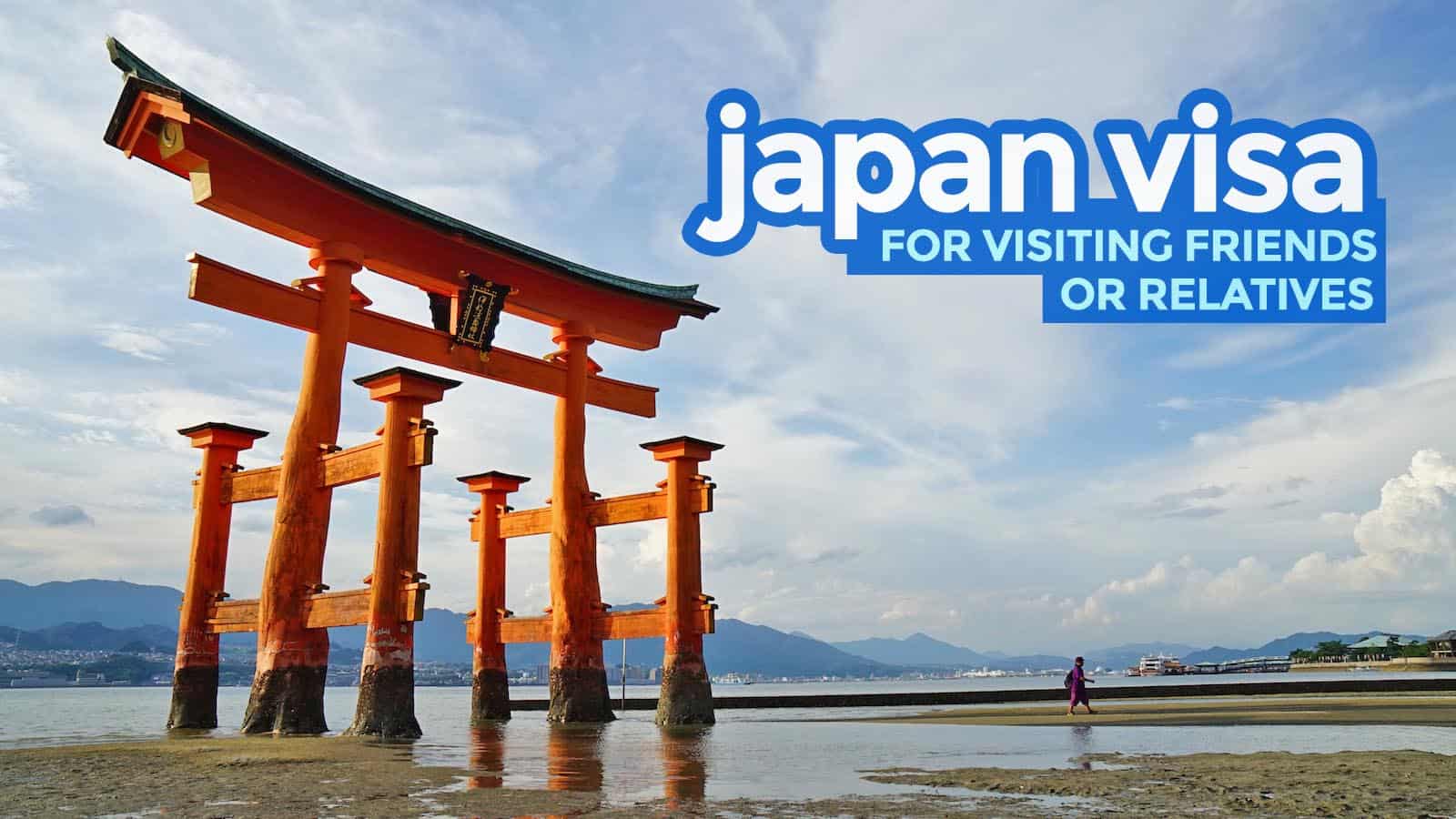
JAPAN VISA FOR VISITING FRIENDS OR RELATIVES: Requirements & Steps

This guide is for applying for a VISIT VISA. If you’re traveling to Japan as a tourist, we have a separate visa guide for that. Read: Japan Visa Requirements for Tourists
When my sister moved to Japan as an OFW, I found another reason to return to Japan over and over again. Before that, I had only traveled to Japan as a tourist. But now that I have a close relative living there, I no longer have to worry about the accommodations and spend any dough on hotels. (Hotels in Japan are expensive!)
However, the documents needed for visiting a friend or relative is different from those required of tourists. Most travel agencies also charge a slightly higher price for it because it’s a little bit more complicated. But no worries, this visa guide will help you go through the entire visa application process.
WHAT'S COVERED IN THIS GUIDE?
JAPAN VISIT VISA REQUIREMENTS
Below is a list of the documents you need to gather for your visa application. Note that documents that need to be printed out (e.g. application form, itinerary) must be done on an A4-size paper.
- Philippine passport. Must have a signature and at least 2 blank pages. Broken passports are not accepted. Must have at least 6-month validity.
- A duly accomplished visa application form. Don’t leave any blank. Just put N/A if not applicable. You may download it from here .
- ID picture. 4.5cm x 4.5 cm. Write your name and birthdate on the back side. Paste it on the application form.
- Birth certificate from PSA. Must be issued within the past one year from PSA Main Office or Serbilis Outlet Center (Nationwide). If the birth certificate is marked LATE REGISTRATION, you must also submit Baptismal certificate, School Record (Form 137), and School Yearbook (if applicable). The address of the church or school must be indicated in the documents.
- Marriage certificate from PSA . Only if you’re married. If not, ignore this one. Must be issued within the past one year from PSA Main Office or Serbilis Outlet Center (Nationwide).
- Daily schedule . Your itinerary in Japan. It doesn’t have to be complicated. Download the format here . Here’s what mine looked like: Sample Japan Itinerary
- Accomplished list of Visa Applicants. Only if traveling as a group/family. You can download the form here .
- Update: Additional Form . On 3 February 2020, the Japanese Embassy in Manila announced that visa applicants must answer and submit an additional questionnaire in accordance to the Japanese government’s decision to impose restrictions on travelers who have recently visited NCOv/COVID-19-affected areas. All applicants must accomplish and submit this form, in addition to the other requirements. DOWNLOAD THE ADDITIONAL FORM HERE!
The list above are just the basic requirements. But there are additional documents needed depending on your relationship to the person you will visit in Japan.
There are two types of visit visas. The first type is for visiting a Close Relative. The other is for visiting a friend or distant relative. The requirements are different.
If Visiting a Close Relative
Emphasis on CLOSE. This applies to close relatives — parent, child, brother, sister, nephew, niece, aunt, uncle. Everything else falls under the distant relative category.
- Birth certificates to prove your relationship . Must be issued within the past one year from PSA Main Office or Serbilis Outlet Center (Nationwide). – Parent-child – BC of both applicant and relative in Japan – Siblings – BC of both applicant and relative in Japan – Aunt/Uncle -> Niece/Nephew – BC of applicant + relative in Japan + parent of relative in Japan. – Niece/Nephew -> Aunt/Uncle – BC of applicant + parent of applicant + relative in Japan.
- Invitation letter from person to visit in Japan . Must be issued within the past 3 months. This must explain why you will be visiting and must have a signature. A template is available right here .
- Family Registration Certificate(Koseki Tohon) . Only if relative in Japan has a Japanese Spouse or relative. Must be issued within three months. Ignore if not applicable to you.
- Residence certificate (Juminhyo) if your guarantor is Japanese OR Foreign Registration Certificate from City Hall if guarantor is not Japanese. Must be issued within the past 3 months.
- Copy of Residence Card or Special Permanent Resident certificate of relative in Japan. Copy of both sides must be submitted.
Without Guarantor
If you will shoulder part or all of your trip expenses:
- Income tax return (ITR Form 2316). They need a clear photocopy of it.
- Bank certificate. Must be issued within the past 3 months. I’m not sure if they require a receipt, but I submitted the receipt too. To be safe, when you get your bank certificate, ask for a receipt too. There’s no telling how big a fund is “enough” to get approved, but (in case you’re wondering) my account had only a bit north of P100,000. I planned on staying for a week. I didn’t encounter any problem.
With Guarantor
If your friend/relative in Japan will sponsor your trip:
- Guarantee letter . Must be issued within the past 3 months.
- Income Certificate (Shotoku Shomeisho) from City Hall, Tax return certificate (Nouzeishomeisho: Form 2) from Tax office (Kakuteishinkokusho Hikae), OR Bank Certificate (Yokin Zandaka Shomeisho). Best if you have all three.
If Visiting a Friend or Distant Relative
Emphasis on distant . If you have friends or relatives in Japan, you may work with one of them. Here’s what they need to give you:
- Proof of Relationship . A letter from the person to be visited explaining their relationship to you plus other documents such as pictures, passport copies, etc.
- Invitation letter from the person you will visit . This must explain why you will be visiting and must have a signature. Must be issued within the past 3 months.
If you will shoulder your trip expenses:
If your friend/relative in Japan will sponsor your trip, you may not be required to prove you could afford the trip. The burden shifts to your friend or relative.
Again, documents to be printed out must be done on an A4-size paper. Other sizes will not be accepted.
All birth certificates must be issued within the past year by PSA Main Office or Serbilis Center.
HOW TO APPLY FOR A JAPAN VISIT VISA
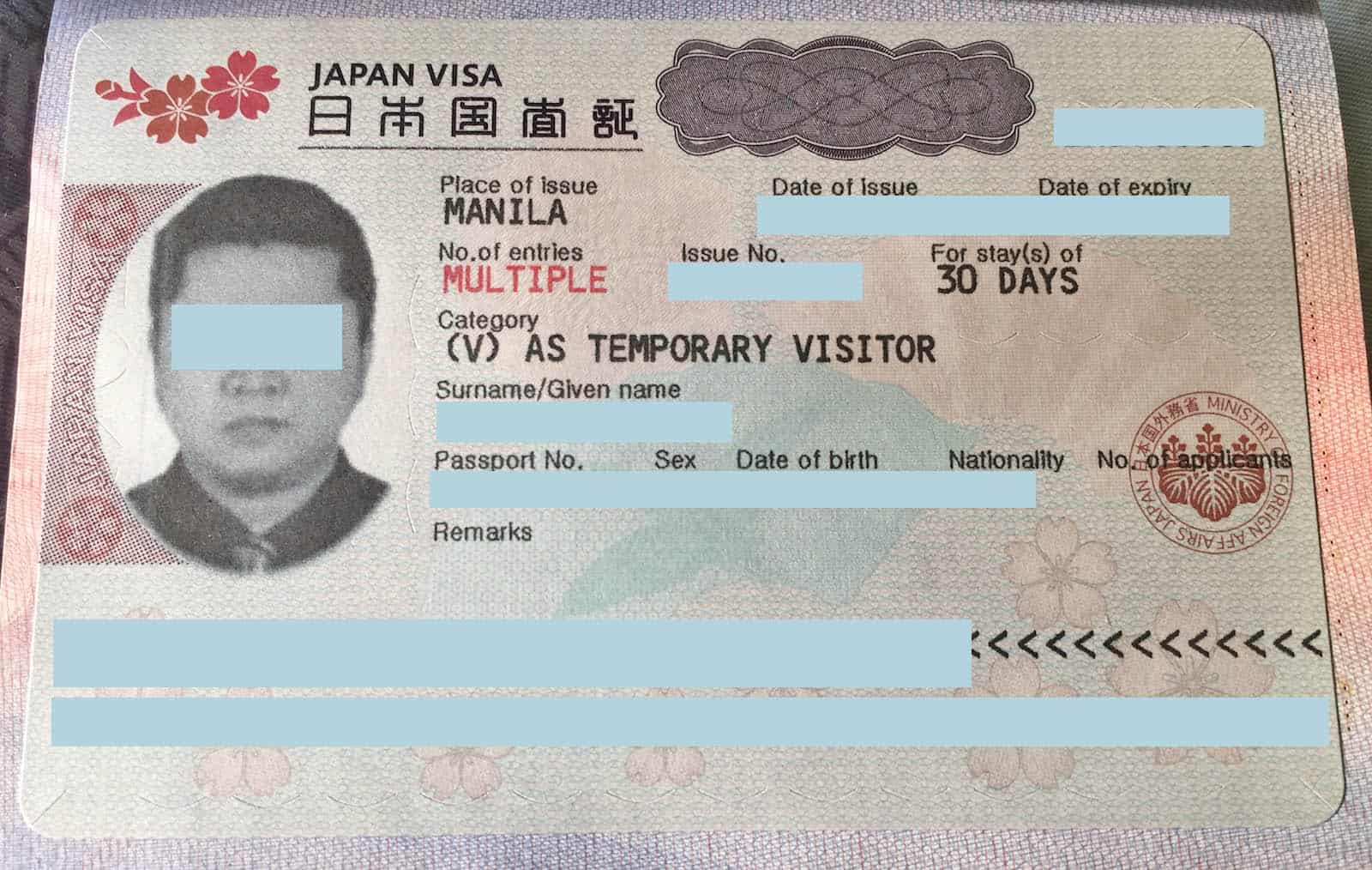
- Complete the requirements .
- Submit the documents to an accredited travel agency . Unless summoned by the Japanese Embassy, you can’t apply directly at the embassy. You MUST course it though an agency. My go-to agency is Reli Tours for the only reason that it is the one closest to my home. Check out the list of accredited agencies here .
- Pay the processing fee . The actual visa is FREE, but you will need to pay the agency that will process your application. The cost of processing a visit visa is much higher than a tourist visa. Every agency charges a different amount, but it’s usually somewhere around P2000.
That’s about it. After the agency accepts your application, the only thing you can do is wait. It takes 3-5 days, sometimes shorter, sometimes much longer. My most recent application took only 2 days. Some of our readers had to wait 7 days. You can’t really tell. Just wait for a message from your agency.
When the embassy returns your passport to the agency, you should receive a message from the agency telling you to pick it up or that they’re sending it to you, depending on your prior arrangement with them.
If it has a visa affixed to it, congratulations! If there is no visa, then your application is denied.
FREQUENTLY ASKED QUESTIONS (with Answers)
How to renew a japan visa.
The process is still the same. The only difference is you don’t need to submit a birth certificate and marriage certificate. But you will need to submit the passport with your old visas.
How to apply for a multiple-entry visa?
We also have a dedicated post for that. You’ll find that here: Multiple-Entry Japan Visa
Do I really need a travel agency to apply? Can’t I apply on my own?
Yes, you need a travel agency. Unless it’s a special case, all visa applications must be coursed through any of their accredited travel agencies.
Here’s the complete list of officially accredited travel agencies: Japan Visa Travel Agencies .
Are flight and hotel bookings required to apply?
No. It’s not a requirement. And it’s not advisable. However, on the application form, you will have to write down the specific FLIGHT NUMBER and HOTEL ADDRESS you wish to take.
How long does it take to process the application?
It varies. My first time, 5 working days. Second time, 2 days. Then on my third and fourth times, 7 days and 2 days respectively.
I know people who have waited weeks for theirs. Pretty hard to tell.
How long is the validity of the visa?
Single-entry tourist visas are valid for 90 days upon issue and will usually allow you to stay for no longer than 15 days. So for example, your visa is issued on January 1, you can enter Japan any time between January 1 and March 31, but once you enter, you can stay for only 15 days maximum.
Multiple-entry visas will usually allow you to stay for up to 15 or 30 days, depending on what is given to you. But it’s usually valid for 3 or 5 years. Meaning, you can visit multiple times within 3 or 5 years since the issue date, but every stay must not be longer than 15 or 30 days.
How much money should I have in the bank to get approved?
We answered that and more frequently asked questions here:
More Japan FAQs
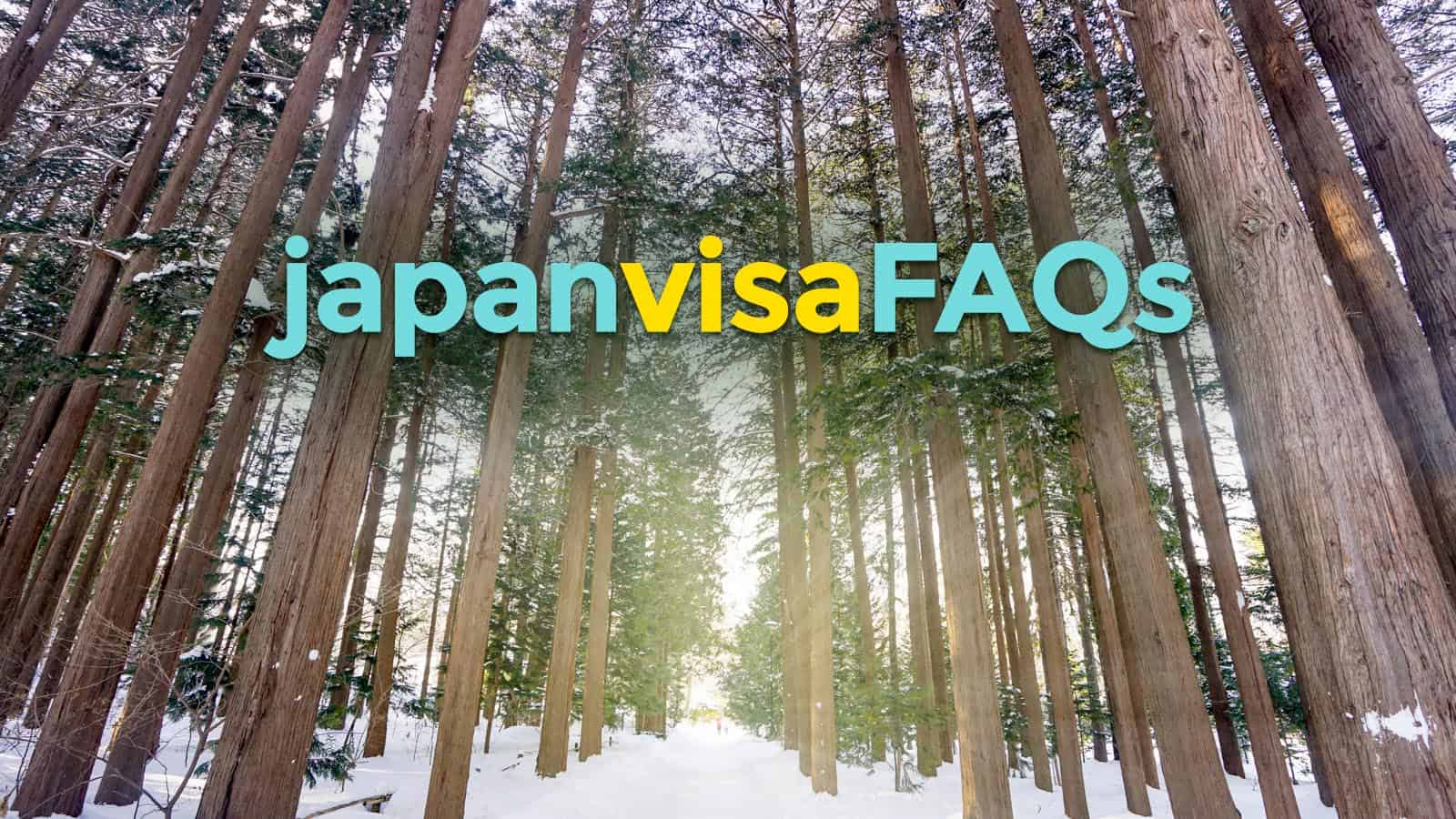
Updates Log
2020 February 3 – Added the new questionnaire (related to Hubei Province) to the list of requirements 2020 February 13 – Replaced the NCOV questionnaire with a new version that includes Zhejiang Province.
More Tips on YouTube ⬇️⬇️⬇️
Is this post helpful to you?

Related Posts:
- JAPAN VISA REQUIREMENTS & Application for Tourists
- HOW TO RENEW JAPAN VISA & Other Frequently Asked Questions
- MULTIPLE ENTRY JAPAN VISA: Requirements & How to Apply
- JAPAN VISA APPLICATION FORM: Sample + How to Fill it Out
- JAPAN VISA: LIST OF TRAVEL AGENCIES Accredited by the Embassy
- SAMPLE ITINERARY for JAPAN VISA Application (Schedule of Stay)
- IMPORTANT JAPAN VISA UPDATE: Additional NCOV/COVID-19 Form to be Submitted
- Avoid These 12 COMMON MISTAKES when Applying for a JAPAN VISA!
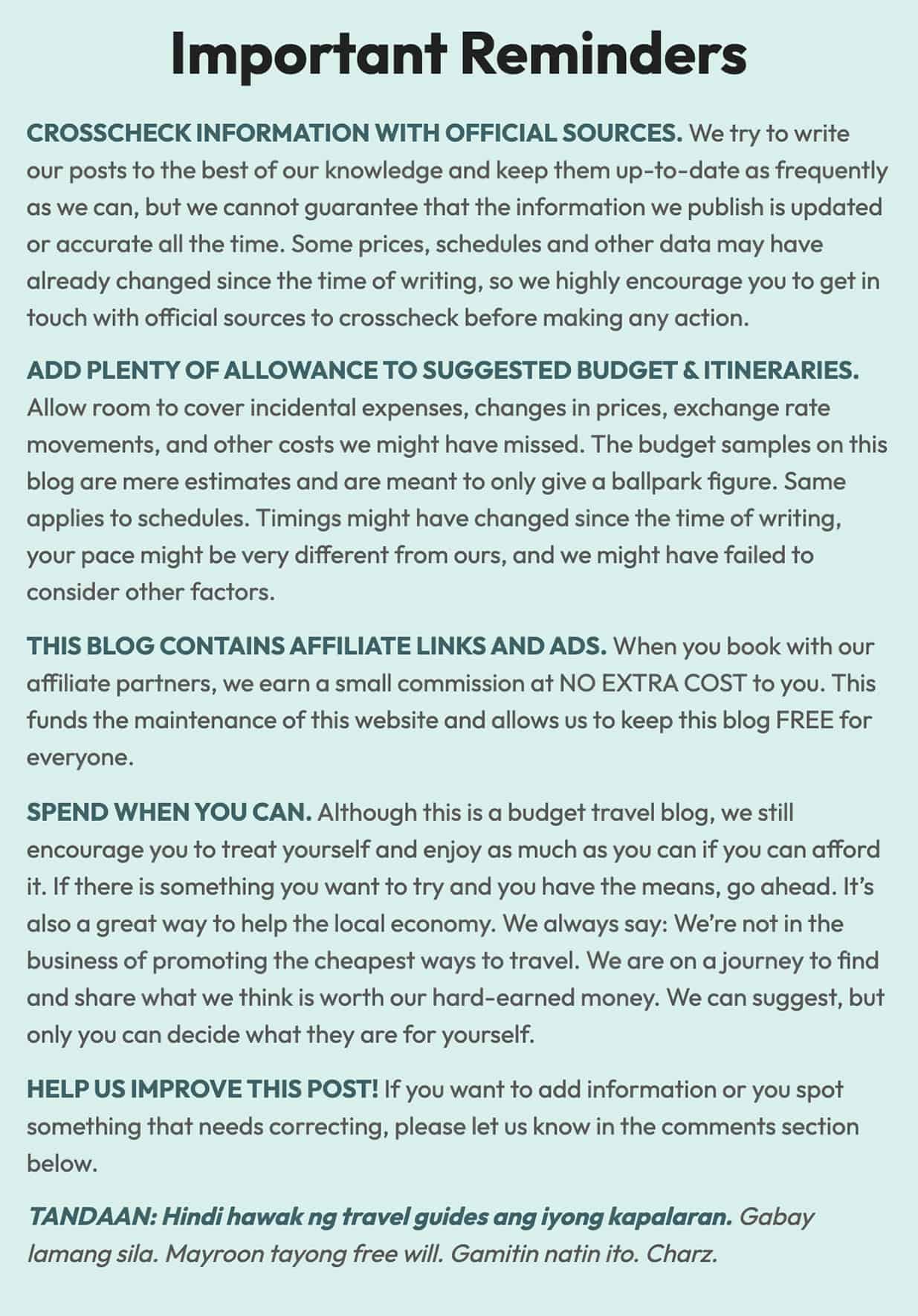
- Recent Posts
- 2024 Philippine Airlines PROMO: Get 50% OFF on PAL Domestic Flights! - 16 May 2024
- 2024 NAIA Departure Guide for International Passengers (Manila Flights) - 10 May 2024
- 2024 Cebu Pacific Promos & PISO SALE with Number of Seats Available - 10 May 2024
Hi! Ask ko lang if saan kayo nag apply? Then sure ba yon na 2 days lang processing? Thank you!
Hi i sm holding Indondian passport , married to filipino , have permanent residence in the philippine , do i need visa going to japan ? Thank you
Reli Tours kami nag-aapply. And nope, like I said in the post, you can’t tell kung 2 days or 3 days or 5 days. Depende yan sa case mo.
I’m living in Japan and will be the guarantor when my friend visit me. I wonder about those documents I provide, like proof of relationship, should be written in English or Japanese?
Would you please contact me I want your advice
Can you please confirm me which documents are required for visit visa ? one of my friend living in Japan and I wanna visit his place Further If you have any information about visit visa please let me know.
I am waiting for your response.
Hi Kangyou, the embassy provides both Japanese and English copies of the documents, so I guess either is accepted. :) My sister usually submits the English version, though.
Hello po..ask lang if with guarantor ano need na docs pagdating sa immigration..i’m traveling with my daughter and full time mom ako. Thank you
Hi Liz, nasa post yung requirements kapag may guarantor. Pabasa na lang po.
What type of visa po kinuha nyo? With guarantor po ba kayo? Im planning to visit japan soon.. wala akong itr kasi unemployed nako pero may bank account ako. My fiance is in japan as a trainee plan namin na magstay sa apartment nya para makasave. Any suggestion po what reqts need ko and sa baby namin.
Liz, ask ko lang if training pa yung partner mo dun nong nagapply ka dineclare mo ba sya and na approve ba ang visa mo kasi sabi nla may limited rights lng if trainee lng ang holder ng residence card sa japan pero tourist visa lng aapplyin ko and ako rin magshoulder ng expenses ko bali invite lng kunin ko sa boyfriend ko na trainee dun
If may guarantor, you don’t need to submit your ITR. But you need to submit yung docs needed from your guarantor, as listed in the post.
Hi i am planning to bring my mother to Japan, i will be guarantor. My passport reads mothers name as “Santhi”(applied long back), whereas my mothers passport reads “Santhalakshmi”. will this be a issue. Please advise.
Good day! Ask ko lang po, my sister is on a student visa in Japan, and im applying for tourist visa and i will be paying for all expenses. Should i declare her as sponsor without her bank details and provide only her residence info? Thank you very much for your response! :)
Hi Abs, if you’re applying for a tourist visa, it would be best to just indicate a hotel and hotel address. If you’re applying for a VISIT VISA, provide her residence info.
Hi, ano po ang mas ok i-apply, tourist or relative visa? malaki po ba ang difference nila 2?
If you’re staying in a friend’s or relative’s house, best to apply as someone visiting someone in Japan.
If you’re staying in a hotel, best to apply as a tourist to avoid complicating your application.
Hello, just want to ask possible ba to apply for visiting a relative kung wala pang one year relative sa Japan? Wala pa kasing tax return certificate yun, right? Thanks.
Hello sir. Tanong ko lang po pwede ba mag stay ng japan kasi ang visa ko for stay in japan is 30 days date of issue june 11 2019 pero ang expiration ay expiry ay sept 11 2019 . Pero nakarating ako dtobsa japan june 25 . Pwede ba ako mag stay dito sa japan bago matapos ang expiry ng visa ko? Salamat
kung for stay of 30 days lang ang approved sayo, hanggang 30 days ka lang pwede magstay kahit pa hindi expired ung visa. Iba yung expiry ng validity sa length of stay allowed.
Hi Tin! Possible. The first time I visited my sister in Tokyo, wala pa rin siyang 1 year. Naka- OR naman ‘yun. Just provide the other docs instead.
Hi! Do you have any ideas on why is the processing taking too long? My sister and I applied for a “Visit Relative Visa” for 90 days as we are invited by our Japanese stepfather (guarantor) and our mother who’s a permanent resident there, and it’s been a total of 45 working days since our application which was way back in April 2. It’s my first time to travel in Japan and it will be the third time for my sister.
Sorry for the long message, and thank you!
Hi nina! I’m also applying for a 90-day visit this december. My guarantor will be the husband of my aunt. I’m afraid I’ll get denied also. Do you have an idea as to why they denied your visa? Did you submit everything listed above? I’m really scared upon reading your comment T-T I hope you reply thankyou
Did you got approved, dear?
Hi Nina, sorry, we have no idea. :( Have you tried asking the agency that processed your application? What did they say?
Well, we just called the embassy last Friday and they said that it’s still processing. It’s giving me the benefit of the doubt that maybe there’s a problem with our papers? (but they’re not calling or emailing us about it) or is it because we applied for 90 days? I’ve known a lot of people that applied for a 90-day visa, but got theirs just in 15 days or less. Also, we didn’t applied for a multiple-entry visa. I don’t know why is it taking too long.
Do you think that our applications will get denied? BTW, thank you so much for replying!
late registration po ako may baptismal po ako pero wala me form 137 pero i have doploma ok n po b sya
Hi Nina, I really have no idea. I guess you’re just gonna have to wait.
I just got the result today-
and it’s denied. Wow. Total of 51 days waiting for nothing. I wonder why it took too long if the verdict would be denied anyway where in fact they could have just sent it back to us like days or a week after applying. It’s very torturing and unproductive, tbh.
Hi po.. Tanong lang kung kailangan po bang original/pwedeng scanned copy ung requirements ng relative sa japan (ex. Guarantee letter, invitation letter, etc.)? I don’t need her as guarantor but I intended to stay in her apartment in the course of my travel. Better ba kung mag book na lang ako ng hotel and apply for tourist visa then cancel the booking later on if approved/ should I really apply for visa as Visit a Relative (medyo hassel kasi ung additional requirements)? Thank you :)
Hi Shiela, not sure if pwede ang scanned copy. Di ko pa natry na scanned. Parating original ang sinusubmit ko (except ung residence card).
If ikaw sasagot, you don’t need a guarantee letter. You just need an invitation letter and the others listed above na nag-aapply sa contact mo dun.
If you apply as a tourist naman, you don’t need to book or reserve a hotel. You just need the name, address and contact number of the hotel you intend to stay in. Di kailangan ng actual booking. If you’re employed and have the means naman, mas madali talaga mag-apply as a tourist.
Thanks for the reply. :)
I’m scared to be denied if I apply for a tourist visa since this is my first international travel and it would look as if I’m travelling alone (I’ve heard that some people are denied because of that, is that true?). In addition, if ever I’ll be denied for a tourist visa can I then apply for a visa for visiting a relative immediately or the 6 months waiting period still applies?
Hi Shiela, as far as i know, the 6 months rule will still apply.
Regarding traveling alone: I have friends who applied before and they traveled alone. Wala namang problem. I think as long as okay naman and pasado sa kanila yung mga requirements, okay lang. Although, mas malaki talaga ang chance if may travel history ka na.
Hello po, Me & my mom are planning to travel in japan, my mom has friend there that going to sponsored our trip. I will ask lang po kung possible po ba yun na dalawa kami ng mom ko sa isang sponsor? Magkahiwalay po ba kami ng application since I’m a student? Need po ba ng ITR & Bank Certificate of my mom for me? My mom been there already but still di pa rin niya po kasi kabisado yung patakaran. Thank you & God bless, sorry for a lot of questions.
I will ask lang po kung possible po ba yun na dalawa kami ng mom ko sa isang sponsor? —— Yes, pwedeng isang sponsor lang.
Need po ba ng ITR & Bank Certificate of my mom for me? —– If may guarantor, di na provided na masubmit yung requirements na kailangan from guarantor. Pabasa na lang sa taas.
Bale magkaiba po kami ng application form dba? Okay po. Salamat & God bless! :)
Yes po. Magkaiba kayo ng form.
Hi po may anak po akong 2 sa x japanese husband they are both japanese.. we are planning to go back in japan soon ano po ang kailangan na requiremnts for me? Coz my daughters they have japanese passport… for me as a mother what is d requiremnts?
Hi! Naku, hindi po namin alam kapag ganyan. Best to just contact an accredited agency directly.
hi po tanong lang sa travale agency po ba kpag nag aply ka ng visit visa sa japan ikaw po ba mag decide kung ilang month or days ang stay mu sa japan
thank you po
Yep, ikaw ang magsasabi kung ilang days ang plano mo. But depende sa embassy kung iaaapprove nila based sa documents (funds/employment/etc) na isusubmit mo.
Good morning po.ask ko lang paano maka apply pa punta nang japan.ang dati ko asawa japanese.may tatlo ako anak.legally wife ako.kasal kami dito sa Pilipinas.gusto ko pupunta nang japan para ma meet ko pamilya nya.
Hello po galing po akong japan last may 24 at umuwi ako nong june 4 nabigyan po ako ng 15 days visa . May nag guarantor po sa aken yong fiancee ko. Plano po namin ulit mag apply ulit ng 90 days next month July po. Sa tingin nyo po okay lang po ba mag apply ulit after 1 month? 90 days. Di po ba ma de denied yon? Salamat pi sa sasagot :)
Mas strict sila in general kapag 90 days ung iaapply.
Hi, I want to apply for single entry visa to Japan. I have a guarantee who pay for my trip but how much should I deposit in to my bank account? Thank you
If you have a guarantor, you don’t need to submit your own bank account. Just submit the docs needed from your guarantor as listed above.
I have been reading this thread over and over and it is really helpful. I have a question, though. I am currently applying for the 90-day visa (visiting relatives) as my sister got birth last March and they asked for help; pareho kasing nag-wowork siya and her husband. The reason behind why they need me there is to take care of their kid/ child care purposes. What are the normal questions pag nag-aaply ka nang 90-day visa? Thanks,
Hi OJ, I have no idea about 90-day visa. But some members of our community might have. You can join our Facebook group and post your question there. Baka someone knows.
Here’s the link: https://www.facebook.com/groups/thepoortraveler
Hi Yoshke, My friend (Filipino) plans to go to Japan with a sponsor visa from a Japanese friend. Would you know if it’s possible and allowed to look for a job there (if lucky) at the same time? Do you know someone who had experienced such case? Thank you.
Hello po…sa proof of relationship po what type of docs is needed? Thank you
We mentioned sa article sa taas po.
Ask ko lang po kasi pareho tayo ng situation. I have also a sister who is residing in Japan. My trip will not be sponsored by her. Ask ko lang po sa application form may nakalagay na guarantor and invinter.
Ilalagay ko po ba sa guarantor N/A
Tapos sa inviter siya?
Hi! Ms Danica ask ko lang po sana if ano po nilagay niyo kasi same situation po tayo.
at the same time dun sa portion na “Nationality and Immigration Status” ano po pala nilagay niyo dito?
thank you po in advance.
Hi Danica, di ko na matandaan yung ginawa ko. Haha. Sorry. :P
Since madali lang naman ifill out, i-blank mo na lang muna tapos i-ask mo na lang sa agency kung saan ka mag-aapply to be sure.
hi, ask ko lng is there any possibilities na ma denie ung application mo kung mlmn nilang naging tnt ka before… but it almost 7 yrs ago when they sent us home. Thank you
hi ask ko lang poz. US immigrant po ako anu po mga requirements pag gusto ko mag apply for tourist sa japan?
We have no idea po pag US immigrant.
Hi,I’m planning to visit Japan soon to visit my fiance’s sister who is sick.,my problem is I don’t have ITR but I have my bank account and properties..my fiance is a retired Japanese and staying here with me in the Philippines for 5 years..
Hi Myra, you have two options. Option 1 is to write a cover letter explaining why you don’t have an ITR. But it only works if the reason justifies it.
Option 2 is to have a guarantor. By having a guarantor, you will no longer have to submit your ITR and bank docs, but you’ll need to submit the reqs needed from guarantors, as listed above.
Hi. Question po. I already have a tourist multiple entry visa. This will be my 3rd time visiting Japan. Problem is by that time I’m already unemployed. I will stay with my boyfriend’s apartment from Dec 19-Jan 11. May I know what should I indicate with my embarkation card? Do I need his invitation letter? Also, he’s holding a student visa. I’m afraid I will be questioned by the IO for staying too long. :(
Hi! As I told in my first message, I will travel together with my fiance and he is willing to shoulder all my expenses, He is a retired Japanese living with me here in the Philippines, he doesn’t have Ute now because he is already retired.. Is it possible for him to be my guarantor even he is living now in the Philippines?
I don’t know the answer to that. Best to consult an accredited agency.
How to apply fiancee visa?
How to apply fiancee visa?nasa japan po ang live in partner ko.plano ko bisitahin sa japan po nagwowork
Hi sir.good noon.ask ko lng po kung paanong paraan ko mabibisita ang fiancee ko sa japan?meron po bang fiancee visa?
Hi Christopher. We have no idea po re fiance visa. :(
Hi! me and my family will travel for the first time in japan for a cruise that includes a stop in korea before going back to japan. i understand that its quite difficult to get a multiple-entry visa for first time visitors. what can u suggest po? and what is the earliest possible time we can apply for the visa? april 2019 po yong cruise. tnx.
Hi Des, pwede yan. In the Multiple Entry form, you can write down the reason why you need a multiple entry visa. Maja-justify mo naman if you explain that you’re joining a cruise from Japan. Basta make sure you meet the other requirements. More info here: https://www.thepoortraveler.net/2017/03/japan-visa-multiple-entry-requirements/
Hi, i have this problem kase my mom doesn’t have bank account sa japan bcuz she was blocked, though she can provide everything except bank certifcate, but somehow I have one. But the only problem is Im a student and i cannot provide the income tax return, so can the agency considered my situation or nah?
Hi Hikari, I don’t know what to advise kapag ganyang case. :(
Hi If my guarantor is from US ano need nya provide? same thing ba estated above na requirements for with guarantor? anyway i have work naman for 2 years and have 80k in my bank account. and we travelled some asian countries, i ask my fiancee to be my guarantor just to make sure ma grant visa ko.
Yung 80K, okay na yun. Marami akong kilala na 50K lang, naapprove na.
Not sure about the requirements pag foreigner ung sponsor eh. Best to consult a travel agency.
hi! pag sponsored po ng company/employer yung trip sa Japan, do we need bank statements to process the visa? thanks
There is a different set of requirements for business-related trips. Usually, it involves a Travel Order and business documents of your employer (among others). Check the embassy website for the complete list.
Hi. Ask ko lang. I planned to go to Japan on April,2019 to meet my boyfriend’s family before wedding namin sa Cebu. My boyfriend is a Japanese peru without guarantor ang visa na i aaply ko. Pwedi kayang e state na reason yung e meet ang parents nang boyfriend ko ? Hindi kaya ako ma question nang embassy ??
Hope to hear from you.. Thank you!!
Hi Lylie, to be honest, feeling ko laging may risk if yung reason ay about boyfriend/girlfriend.
Hi, mag travel po kami ng pamangkin ko na japanese citizen/ filipino recognized 8 years old need ko pa po bang kumuha ng dswd certificate dahil minor sya? Ang mother nya po sister ko, housewife po ako and my husband is a civil engineer in dubai sya po sponsor ko sa travel ano pong need na documents, Purpose lang namin is magvacation dun ang anak ng sister ko for 3 weeks.
Hi Melody, para sa Immigration ba?
If Japanese citizen sya, I don’t think need ng DSWD clearance. Yung pamangkin ko, nung nagka-resident card sya, hindi na sya nirerequire ng DSWD clearance. Nag-try kami mag-apply dati pero hindi na kami binigyan ng DSWD. Di raw need. I’m guessing it applies to citizens too.
To be safe, call the regional DSWD office and confirm.
Is it okay to apply for visa this year but travel date will be 6months after? Schedule not definite for the travel.
Hi! Usually, yung visa ay nag-eexpire after 3 months (90 days), so ideally, ang earliest na pag-apply ay 3 months before.
Hi. Okay lang po ba kung Bank certificate lang ang masusubmit? Invite ko kasi mom ko and 4 months palang ako dito sa Japan.
Hi jackblack, ang alam ko, kahit one lang dun sa 3 ay okay lang. Nung first time kasi ako na nagapply na visiting relatives, di rin all 3 yung sinubmit. Pero best talaga if all 3.
Hi po. Ask ko lng po kasi im already a permanent resident here in japan and i have a friend sa pinas now i want to invite here in japan kasi tagal n namin d nagkita and makapag bonding kami uli but its not her first time to come in japan shes living there before and deported for overstaying but it was 10 years ago, they will allow her again just a short time visit?
Hi Mika, naku, I’m not that familiar with the rules covering that. My guess is it’s going to affect her application because it could still be on her record.
hello po ask lng yoshke ang husband ko po plan to visit his half sister in japan ..same requirements lng po ba yun like sa whole siblings if not ano po ang need documents para don? tnks po
Hi Monette, di ko po alam if may additional docs pag half-siblings. Pero yung tinitingnan kasi nila sa birth certificate ay kung may in common na parent. Feeling ko, if may common na parent naman sa birth certificates, ok lang yun. Pero feeling ko lang po yan. Best to contact the travel agencies na lang po. Yung numbers ay andito: https://www.thepoortraveler.net/2018/08/japan-visa-travel-agency-official/
hi. I would like to apply for a tourist visa with a guarantor which is my Mom who is also travelling with me. In the application form, there is a guarantor section. Does it pertain only to guarantor from Japan or I should fill it up also with my mother’s info? thank you!
Hi Sha, yung experience ko when I joined a friend na mag-apply, dun niya sinulat ung guarantor nya na based in PH. Di ko lang alam if ganun pa rin ngayon.
Hello Po good pm ask ko lang Po meron Po ako fiance and then siya Po magiging gruarantor ano po mas maganda visa ang kukunin kasi gusto Po niya 90 days Po Thank you Po .
Mas mahirap kunin ang 90 days na visa and mas prone na ma-deny yun.
Call na lang the travel agency kung saan mo balak mag-apply for details.
Hello, may question ako. May plan kami magpunta ng Japan next year. Kasama ako, mama ko, friend ni mama ko (american citizen) pati yung nephew ng friend ng mama ko. Ngayon, ang balak ng friend ng mama ko na american citizen is sponsoran kami papunta sa japan. Lahat ng expenses sa kanya. My question now is kaming iisponsoran kailangan din ba magsend ng ITR, bank accounts? Or kung meron man na requirements. Anu-ano po sila? Maraming salamat sa sagot.
Hi Anne, may bibisitahin ba kayo sa Japan? Or as tourist lang?
If as tourist lang, pabasa na lang ng post na ‘to kasi nakasulat naman lahat ng requirements: https://www.thepoortraveler.net/2013/11/japan-visa-requirements-manila-philippines/
Hi! I plan to visit Tokyo on March 2019 for 7 days, but I will be staying at a friend’s home. I don’t have the residence certificate yet but if ever, okay lang po ba na mag-apply ako for tourist visa instead of for Visiting Friends/Relatives?
Then can I just show the invitation letter and residence cert. at immigration instead?
Also, can you please advise which of the two visa types will I have a higher chance of approval? Since this will be my first solo trip abroad, and my first time abroad after a long time. I’ve also read about how they’re cautious towards single females who have no established travel history. I employed naman po and have sufficient balance in my bank account (based on this post).
Thanks so much!
Hi Ali, I’ve done that before, although not intentional. I applied for a tourist visa for a trip to Kansai but that trip was cancelled. Later on, I had to visit my sister in Tokyo, so I used the same visa. I didn’t have any problem. So I think it’s okay. I’m not sure though.
The better visa type is the one that you can support better. If your funds are not that big, better na Visit Visa and have an Inviter/Guaranter. Pero if kaya naman ng financial and employment docs mo to stand on their own, Tourist Visa is simpler and cheaper.
Hi! Thanks for the response!
Another question po. If I do get approved, is it okay to present a scanned copy nalang of the invitation letter to immigration on the date of departure? Or would they still look for the original copy?
Hi ALi, I don’t know for sure. Pero you can just have the original to be sure.
good eve po . ask ko lang po sana nkapag apply po ako extension visa for my parents for temporary visiting here in japan nung dec 28 but Jan11 po ma expired po visa nila which is kakarating lng po ng hagaki ngaun po sa bahay d po ba magkakaproblema yun ? tsaka kung hindi man po pwede po ba sa friday ko na ipupunta sa immigration ung hagaki na dumating kasi po total nkalagay nmn po vali til jan 24 pa po sya .
Hi Xii Lah, di ko po naintindihan yung question nyo. :(
And wala rin po akong alam sa extension visa.
ay ganun po ba extension of stay kasi ung tatanong ko sana .
Ah, naku, wala po ako idea pag extension. Sorry po. :(
Hello po, Goodmorning, ask ko lang po sana kung kelan pwedeng mag apply ulit for japan visa for visiting relatives. Kakauwi lng po kasi namin last year December. nabigyan po ako japan visa june . kailangan pa po ba maghintay ng six months? salamat po. :)
Nope, di mo kelangan maghintay ng 6 months kung di ka naman denied.
Ako ung nag-apply for my cousin for VISITING RELATIVES visa na kakauwi lang din namin from Japan ng November Week 1 tapos need na bumalik ng December Week 1 so November Week 3 pa lang, nag-apply na kami ulit, wala namang naging problema.
Hello just want to ask pagdating sa immigration my husband is inviter lang hindi ko sya ginawang guarantor i dont need to have AOS tama po ba pagdating sa immigration? Also new format na yung Invitation letter wala ng signature ok lang kaya yun?
Ganun po ba. Salamat po sa info.
Hello, Miss Kathryn! Navisahan ka ba? Sorry for intruding. Same case lng kasi sa akin and I got denied
Since 2019 na po today, pero wala pa pong nirerelease na ITR for 2018. Yung 2017 ITR pa rin po ba yung isusubmit?
Hi Kyla, yep, pwede pa yang 2017 ngayon. :)
hello po ask ko lang po sana yung sa letter of invitation and guarantor letter na pini-fill upan ng mag iinvite sayo pa japan okay lang bang ipasa sa agency un ng naka japanese words (since ung guarantor ata mag provide non) pag mag aapply ng tourist visa or fiancee visa? diko po kasi masyado na gets sa part na yon.
Di ko po sure pero ang alam ko po okay lang yun na in Japanese.
ung asawa kong hapon ang guarantor para kunin ang mother and brother ko sa pinas papunta dito sa japan. pero ako naman ung nag iinvite…. ung pinasa nila ang papel sa agency. ung copy license ng asawa ko binalik nila or di nila tinanggap, kundi residence card ko lang kinuha nila. pero dati dati kinukuha naman nila ung license ng asawa ko. 3 times na kasi nagpupunta dito mother ko lang. ngayun dalawa sila sabay kukunin ko. nagtaka lang ako na bakit di na kailangan ang copy ng id license ng asawa ko.
Hi cent_derela, by “kukunin”, what do you mean exactly?
Hi po ask ko lang po sana kung halimbawa pong walang bank account malaki po ba chance na madenied? government employee po ako for 9years na din po gusto ko lang po mgtravel sa japan first time ko po at ako lang din po mag isa, o mas okay po ba magtanong na lang po sa accredited na travel agency? Thank you po
If wala po kayo bank account, best to have a sponsor po na ideally immediate family member para bank account nila ung isusubmit.
Gud pm sir! Nabigyan po ako ng 15 days visa as a tourist tapos gusto kong mag apply ng multiple kakauwi ko lang jan 4 2019.kailan po ba ako pwedeng mag apply
Hi Bell, pwede naman anytime. Ang alam ko wala namang limit yun. Naranasan ko nang mag-apply within the same month ng pag-uwi ko from Japan, wala namang naging problem.
Hello, Yoshke! I just want to ask if you have tried applying for visa two days after you arrived here in Philippines? Kauuwi ko lang from Japan ng Feb. 4, 2019. I stayed there for 186 days(lumampas ng 8 days ang extension ko dahil hindi agad nirelease ng Japanese Immigration but I know there’s no problem coz we applied 2 weeks before my visa expiry and it was indicated that my application was on process already)
Anyway, bago ako umuwi I messaged the travel agency where I always apply my visa- that was my 3rd time in Japan, I asked kung kelan ako pwedeng mag apply uli and they responded, ‘pwede na po mag apply agad pagkauwi nyo pero nasa Japan Embassy pa rin kung mavivisahan kayo’. With that nagkaroon ako ng hope na mavisahan uli agad because I think my reason was valid. I am taking care of my half Japanese nephew. Sister ko ang guarantor ko and she is a single mother. My nephew’s class schedules are from 8am until 2:55pm(Mondays & Tuesdays) 8am until 3:45(Wednesdays) 8am until 2:45(Thursdays) and Fridays are same as Wednesday. My sister works from 8am-3pm but leaves apartment at 7:45 to catch the bus and arrives apartment at 3:45pm. Depends on what time the bus will arrive at the stop…. Her workplace is like 45 minutes walk and most of the time nale-late ang bus kaya nakakauwi na ang nephew ko bago pa sya makauwi… Our apartment is located at the 3rd floor at naexperience ko ng mag slide once kaya nag aalala ako para sa nephew ko na kahit 9 years old na eh parang 6 yrs old lang… Anyway again, after 3 days may resulta na ang visa application ko. Denied at alam naman natin that Japan Embassy do not tell the reason as to why the visa application was denied. Ang gusto ko lang malaman ay kung pde ba akong mag apply ng appeal? Wala kasing ibang ma iinvite tlaga ang sister ko para mag alaga sa anak nya. And I also want to know kung bakit sinabi ng agency na I can apply as soon as I arrived in Philippines gayong madedeny naman pala. Thanks and sorry for my long message
Hi Eloisa, naku, di ko alam if pwede mag-appeal. :(
Pero tama naman yung agency nyo, wala naman yun sa gaano ka-soon ka nag-apply ulit. Kasi last November lang, I applied for my cousin na less than 2 weeks lang after nya makabalik, naapprove naman.
Ang feeling ko na naka-taint sa application mo was the fact na lumagpas ka sa extension ng previous visa mo. And whether or not kasalanan mo yun or kasalanan ng Japanese Immigration, I don’t think may time sila to check or verify given na ang dami nilang pina-process in a day. They only have a few minutes to assess each application so if may something off, baka dine-deny na nila agad. Speculation ko lang naman yan.
Pero ayun, di ko alam kung paano dapat gawin. :(
Hi, i’ll be applying for a tourist visa for april 2019 trip. i already have plane tickets and hotel booking (with free cancellation) but my friend who is working in japan said i can stay at her place instead para makasave sa accomodation cost. My worry is paano pag immigration will ask me saan ako mag stay, pwede ko kaya sabihin na sa friend ko ako magstay kahit nakatourist visa ako?
Possible po kaya na maapprove po kami ng multiple visa entry if first time lang namin mag visit ng japan?
Ang plano po sana namin 5 days in tokyo (since relative ng friend ko nagstay sa tokyo japan) . Then pupunta kami ng osaka and magstay po kami for 3 days. ang entry po namin tokyo and exit po ay osaka?
Hi Cathe, ang alam ko, pag visit visa, malabong mag-multiple pag first time. Mas ok pag as tourist and dapat marami kang funds. For more info about Multiple Entry Visa, check out: https://www.thepoortraveler.net/2017/03/japan-visa-multiple-entry-requirements/
What are requirements for senior citizens who will just spend a vacation in Japan for 10 days?
Hi ask ko lang if naapproved ka ng 3months kelan ka uli pwede mag apply for japan visa pero invitation lang is friend? Thanks
Hello! I have a question. What if my Japanese citizen cousin will be the one who will invite me and be my guarantor? Is it still fall under the close relatives? And for the proof of relationship? Ex: My BC –> Mom’s BC —> Aunt’s BC —> Cousin’s BC/Koseki Tohon Is it correc/t Thank you!
Hi Mikka, sa definition nila ng close relative, di kasama ang cousin pero I was able to apply for a family member na ang inviter/guarantor ay first cousin din sa Japan and yep, yung birth cert nya + parent’s + inviter’s parent’s + cousin’s ang ginamit. Kaya lang, Pinoy ung inviter sa casa na un. I think okay lang kahit Japanese.
Hello ma’am we’re planning to visit japan this sept, am62years old i have a phil. passport and used already when we traveled in singapore and vietnam. My worries now is that my birthcert was a late registered i have no baptismal cert. And have no form 137 ihave a high school diploma voters cert and marriage cert. drivers license also. would this be enough docs to show for applying a japan visa pls reply. Thank you.
Hi po! Best to consult na lang po an accredited travel agency for this kasi di ko po alam pag ganito ung case. :(
Hi! I am 21 and was planning to visit Tokyo on my own. I have a job kaso here in Riyadh kaso bago lang po ako dito which I think did not help with my visa application. I tried to appeal their decision kaso di na daw pwede.
Meron po kaming relative sa Japan, third cousin ko siya (yung dad niya po pinsan ng lola ko). Ang problem po kasi di ko siya nakausap or nakita before pero may contact parin naman po sila ng mga tita ko and she agreed to be my guarantor. Should I still apply for the visa or try nalang after 6 months?
Hello. Naku, sorry po, di ko pa alam what to advise. Pero if I were in your shoes, hintay po ako ng 6 months.
Hi, Question, meron ba hinihingi docs yung japan immigration in the visa applicant is invite? Or the passport with visa is enough?
In my experience, parating passport and visa lang. BUT to be safe, best to have proof of accommodations and return ticket. Ang PH Immigration, madalas hinihingi yan.
Hi yoshke Im planning to invite my sister here in japan, they my sister need a medical certificate?
Hi po tanong ko po anong aapply namin a visa po nandon po kasi asawa ko japanese po 4days lang po kami don. Ehh dito lang po kami kasal sa Pilipinas d po kami kasal japan ano pong visa po tourist po ba visiting relatives po patulong po lamat ng madami
Hi just want to ask, pag nag pasa ba ng COE and ITR tatawagan ba ng embassy yun company na pinapasukan ko para i verify? thanks!
Pwede nilang tawagan. Although sa experience ko, never pa natawagan ung employer ko.
Hi, i’ll be applying for a tourist visa for July 2019 trip.but my aunt who is working in japan said i can stay at her place instead para makasave sa accomodation cost. My worry is paano pag immigration will ask me saan ako mag stay, pwede ko kaya sabihin na sa aunt ko ako magstay kahit nakatourist visa ako?
Hi. May concern lang aku kasi ang situation namin is visiting kami. Mama at kapatid ng partner ko nsa japan. Kami naman ang gagastos ng expenses namin pero dun kami sa bahay ng mother mag stay. Need parin ba namin mag request ng guarantee letter to prove na may matutuluyan kami? Or di na namin need dahil kami naman ang gagastos sa expenses namin. Feel ko kasi same tayo ng situation nung nag visit ka sa sister mo. Dun ka nag stay sakanila pero ikaw ang nag shoulder ng expenses own expenses mo. Thanks ahead sa reply! Much appreciated
Sa experience ko po, since ako ang sasagot ng trip ko, di na ako nag-guarantee letter.
Hi Yoshke! Just want to ask if sa IO, hahanapan pa din ba ng AFFIDAVIT OF SUPPORT kapag visiting a relative (my Filipino husband) kahit na ako pa rin magshoulder ng expenses ko and magstay lang ako sakanya for a week before we go around Japan the next two weeks? I have my visa already.
what happened po hinanapan po kayo ng AOS kahit ikaw naman po magfinance ng trip?
Helo poh im anne. We planned po ng sister ng furture husband ko na mag visit ako sa kanila sa japan and der weling to become my guarantor poh. 3 months daw yong visa ko to stay. Wat if po gusto to ko pang mag stay longer po. Pwd po bah kami mag apply ng extension for another 3 months poh??
Hi Anna, di po ako familiar sa rules pag extension. :(
If travelling with guarantor po, ano po mostly need ni PH immigration on the day of departure aside sa unexpired passport with valid visa and return ticket?
This might help: https://www.thepoortraveler.net/2014/03/offloaded-philippine-immigration-rules-requirements-airport/
Hello ask ko lang anu requirments if i will travel with my bf. Pero ang bf ko nasa US sya. Sya po sponsor ko.so magkikita nalang kami sa Japan
Hi Pearl, check out this post instead if you’re traveling as a tourist: https://www.thepoortraveler.net/2013/11/japan-visa-requirements-manila-philippines/
Hello! I want to invite my sister here in Japan next year but the problem is that I’m a housewife. Is it ok to apply for visiting family visa? My Japanese husband will cover some of my sister’s expenses and my sister will also have her own pocket money. Is it ok to be the guarantor? Can my husband act as my sister’s guarantor too since I’ll submit his itr ?Is it ok just to submit my husband’s documents ? And also is it better to buy air tickets before applying ? We’re actually waiting for a seat sale.thank you
Hi Jen tak, I think okay lang if your husband is the guarantor. You’ll just need to prove yung relationship. I think birth certificate mo and ng sister mo, and marriage certificate mo with your husband. :)
To be sure, call na lang din the agency where you will lodge your application.
Hello po, i just wanna ask if yung guarantee letter po is notarized? And may idea po kayo how much show money ang ideclare for the guarantor. Yung mom ko po kasi guarantor ko kasi student pa lang po ako. and kaming dalawa po yung mag travel to Japan for 5 days. Thank you!
Hi April, di ko alam kapag ang sponsor is hindi taga-Japan. Parang di naman kailangan na notarized especially kung sabay yung application nyo.
You’re visiting a friend or relative in Japan, right?
Hello po ask ko lang po kung gaano katagal po yung process po nung visa kapag na denied po. Na denied po kasi yung inaapply kopo na tourist visa then pinagaapply po ulit ako ng agency ng visit relatives visa para hindi napo ako mag wait ng 6months. Then ask kopo if pwede po na yung gurantor kopo if mother ko kasi student palang po ako. Kung pwede po ano po yung requirements po niya. Thank you po.
Hi guys just want to share my experience recently. I applied for a tourist Visa last month at Attic Tours SM North. They did not include my COE and they accepted my bank cert with only 60k for 8days stay in Japan. After 2 days i got the result it was denied. It was devastating coz I already purchased my plane ticket for august trip. I decided to reapply with different purpose, to Visit a Friend since im going to visit my Filipino boyfriend working there.
I completed all the requirements (docs from my boyfriend), included my COE, approved leave, flight itinerary, hotel booking, etc. and submitted 2 bank certs (about 200k+ total). I applied at UHI Dusit Makati last week they accepted my reapplication. They are very accommodating. I even went to padre pio and quiapo church to pray for my visa approval. Luckily, I got my Visa after 2 days and it was approved.
Hope this helps for those who got their toursit Visa denied. Thank you so much for this blog I followed all the instructions and tips you provided.
Thanks for sharing this, May!
Question lang po, Meron po akong ME tourist Visa that i’ve used once last December. This coming August po may planned trip ako to Tokyo but this time i’ll be staying in my friends house. Would it be ok if i write my friends address sa immigration form? do i need to provide additional document? or do i need to apply for a new visa under visiting a friend/relative? Or would be ok if i just create a mock-up booking and write the hotel’s address instead since i’m just staying for 9 days?
Hi Felipe, I think it’s okay to write your friend’s address. I do it all the time.
My cousin and i are planning to travel to Japan, together with my mom and her mom (they are siblings), the invitation would come from our mom’s sister in Japan, but the guarantor would be my the husband of my aunt in Japan, is it allowed?
good day po long term visa ko ako dito s japan (mother of a japanese national) gusto ko po sana kunin ang nanay ko at pamankin ko as visiting relatives mabigyan po kaya sila ng visa ? me work po ako kaso d ako nagbabayad tax. pero meron ako yokin sandaka shomensho. thank you in advance.
Hi Cha, yes, I think that’s okay. You just need to prove the relationship.
Hi Sofia, naku, di ko po alam. Best to contact a travel agency po para sigurado.
hi po ask ko lng my aunt invites to visit her in she has parkinsons the problem is i have my PSA birth certificate but my mother sister ng aunt ko have no records in PSA but i check with my parents marriage contract it shows my mother ‘s parents same as to my aunt and its has PSA copy of it can i use it as subtitute to my mothers birth certificate as prescribed
Hi Yoshke Dimen, I’m Cat. I am planning to see Japan this November. It’s only a 4-5 days trip. Plano ko din kasi i-meet ang cousin ko from Nagano. It is advisable na kaming 2 ng husband ko ang mag-apply ng Visa since sya talaga ang may fixed employment or okay lang ba na ako lang ang mag-apply at sya ang guarantor ko. I’m quite scared kasi na ma-deny. Medyo heartbreaking! hehe. Please enlighten, many thanks.
If Visit Visa, pwede rin na ang cousin mo sa Japan ang mag-guarantor. Madali lang naman iprove ang relationship kung first cousins kayo.
Okay lang naman if yung husband mo ang guarantor kasi normal naman na yung spouse ang guarantor. You just need to submit marriage certificate. Basta okay naman ang finances and employment status ni husband?
Pero in my opinion, if husband mo ang guarantor tapos andito sya sa Pilipinas, less complicated kung Tourist Visa ang iapply.
Good day po! I’ve been there last June 2019 and kababalik ko lang last August 2019 at planning to re apply again maybe next year hopefully. Possible ho ba na mag apply for 180 days? or maximum na talaga yung 90 days sa (relative visit)
Ay, di ko po alam. :(
I have a car company. how can i get visit visa invitation for my business?
Good day po!
I just want to ask, i have a relative in Japan and let’s say i will stay in her house. But she will not sponsor my trip. Do i still need to include that i have a relative there to visit but well in fact i will just go there for tourism. I will just stay in her place. What will you suggest? Will apply solely for tourist? Instead of applying for visiting a relative, cause as i can see it’s more complicated if that’s not really the reason of the trip.
Hope to hear from you.
I always side kasi with the truth, so if I were in your shoes, I would still apply for a Visit Relative visa kahit na mas mahal sya and mas maraming requirements. But that’s just me.
But there are also a lot of applicants na ganyan ang case who choose to apply for a Tourist Visa and enter hotel details na lang kasi nga mas madali and mas mura.
Thank you for your suggestion. I agree with you. I also want to be honest. I’m confused.
Kasi i asked my cousin what to apply and she told me it is better if i will just apply for tourist visa but i can still put her home address. What do you think about her idea? I made a comment here because i know you could help me or enlighten me. Hehe..
i’m a follower of this site, you helped me with my dubai visa last yr. I really appreciate your time for answering my queries.
Thank you so much
In my opinion, kapag ganyan, baka maging confusing sa mag-aassess and pagdudahan ka pa.
If you’re staying with a relative, technically, you are visiting a relative, so makakagulo if tourist visa aapplyan mo tapos you’re declaring na you’re staying with a relative.
Alright then, will take note of that. Thank you so much
Hi! I’m staying with a friend in Japan next month, my Visa has been approved. Do I still need an invitation letter from my friend? I’ll be staying at her house in Tokyo and a hotel in Osaka. Will the immigration officers ask for an invitation letter since I don’t have a hotel booking in Tokyo? If yes, do I still follow the invitation letter format for visa application? Thanks in advance! :)
1. What’s your first stop? Osaka or Tokyo?
2. Are you employed?
3. Is it your first time to travel abroad?
1. We changed our itinerary, we are now going to be staying in Tokyo for 6 days and will not go to Osaka anymore. 5 nights at a friend’s house and 1 night in a hotel.
2. I am employed as a freelancer but I have a COE and a company ID from the current company I am working for
3. Not my first time, I already went to SG, TH and Taiwan.
If you’re nervous na baka harangin ka ng Immigration, the best document to have is an authenticated Invitation Letter.
But the thing is, hindi sya parating hinihingi ng Immigration Officer. Yung madalas na hingan ng ganyan ay yung first time mag-travel abroad na may ivivisit. So ako, pag nagvivisit ako sa sister ko sa Japan, I usually just bring company ID (or COE from my clients when I was a freelancer) and yung Letter of Invitation/Guarantee na ginamit sa visa application. Di rin naman hinihingi.
I guess, what I’m trying to say is, it depends on how confident you are. If you want to be on the safe side, you can get an embassy-authenticated document. But there is a big chance na hindi ka rin hihingan nun since you’re employed and it’s not your first time.
Re: Hi! I’m staying with a friend in Japan next month..
Also, my visa was approved without an invitation letter.
HI Kim! Just want to know if the visa you applied is “Visiting a friend” since you’ve mentioned you will be staying at your friend’s house? And if you did applied for “visiting a friend”, isn’t required to submit an invitation letter as well? I’m planning to visit my boyfriend in Japan this coming April and will be staying at his apartment but I will be shouldering all of my expenses. Thanks in advance.
Hi ask ko lng po if magapply ako ng visiting relative sa japan kahit na sister in law ko nagbigay ng papers at brother in law? Asawa po kasi ako ng kapatid na ngbigay papers skn, considered parin ba un as visiting relative?
Questions lang po, Manggagaling po kami sa Pinas lahat 1. ) Yung nanay ko po kasi guaguarantor nya po ang tatay ko na unemployed, pero si nanay po is working in America Green card holder but not yet citizen. Okay lang po ba na yung ITR nya at bank certificate from America lahat kasi wala po sya pag galing pinas eh? 2. ) Guaguarantor po ako at ang anak ko ng brother ko ,sabay po kami magaapply buong family, okay lang po ba kung photocopy nalang po ang isubmit namin ng anak ko na ITR,bank statement,PSA nya kasi nasaknya po yung original yun kasi ang ipapasa nya magaapply din kasi sya ng visa, pero 2nd time na po nya sa JApan. 3. ) Yung married friend ko po isasama nya anak nya na student, guarantoran nya, okay lang po ba photocopy nalang din yung marriage contract,PSA ,ITR,bank cert ang ipasa nya for his daughter kasi ung orig ipapasa nya for his visa rin eh. SAka ano po ba additional need na requirements pag student?
LATE REGISTER SA NSO ang tatay ko wala naman syang school requirements or baptismal??
Hi Yosh! Just really curious about this kung may difference ba or nakastate ba sa visa category kung visiting relatives ka kapag visiting relatives visa ang iniapply mo or same as tourist visa lang na ang nakalagay na category is temporary visitor?
is it possible for my girlfriend to come and stay in Japan for a month if I(working visa holder) were to sponsor her?
Hello po! Thank you for the info! I just have a question, I have a working visa here in Japan, and I would like to sponsor my girlfriend with that kind of visa po (visa for visiting a friend) would that be possible? Since she’s not really a “friend”. Should I say on the invitation about our relationship? I’m really not sure if they’ll believe us because me and my girlfriend are both girls.
Hello po, if tourist visa po ba sa japan ng 6months, may possible way po ba para maka pag work po?
Bawal po mag work ang tourist visa as far as I know. You need stamp po sa likod ng residence card to be able to work. :)
Hello po, Charisma here. I am waiting to reopen Japan again. I just wanna ask about my situation regarding about my visa application. My Boyfriend invited me to visit him in Japan po, do you think I have a big chance na maaprobahan ang visa application ko po? He’s a Japanese citizen and a German citizen as well. He has his own company for about 10 years there in Japan. We’ve known each other for 2 years, and when I was working in Singapore he visits me there every month,we met at least 4 times. Pero nuong nagumpisa na ang corona virus hindi na siya makatravel to see me. I hope you could answer my question. Thanks po
Hi my sister will sponsor me, and her fiancé is a navy. What requirements my sister needed ?
Hi ask ko lang kung pwede nalang i email sakin yung invitation letter then i print ko nalang or kailangan ipadala pa dito sa pinas from japan?
Hi Chloe. Not sure po kung pwede email. Sa case ko po kasi, ina-ask ko dati yung ate ko na ipadala saken yung physical copy so yun pa lang po natry ko.
Hello. May I ask coz I just got married last August with my Filipino husband whose work is based in Japan. He’s been here for 6 months already but he’s expected to return to Japan in November. Since our PSA marriage cert is not yet available in PSA, we cannot process the dependent visa yet coz the processing (incl. COE) may took for months and I have a flight this December. Is it okay if I apply for the sponsor visa (visiting relative) even if spouse is not included on it? Appreciate your help po. Thank you po.
Hi Jie, I don’t know for sure, but I think you could because a spouse is considered within third degree of relationship. The challenge is proving your marriage if you don’t have marriage certificate yet. You might want to find an alternative supporting document and explain it.
To be absolutely sure, since Japan utilizes travel agencies, it’s best to contact a designated travel agency and ask them about what to do since you’ll be coursing the application through them anyway.
But please note that if applying for a short term visit visa (visiting relatives), honor and follow the restrictions allowed by that visa.
Good Day Sir! What if I will visit my OFW husband in Japan? And kailangan ko bang documents na ipakita as proof of relationship namin is young marriage certificate po? Walt quasi door sa sample Inyo yung husband po. Thank you.
Hi, thank you for all the information. It is very helpful and informative.
I just have a question. My Japanese boyfriend is currently working here in PH and he has a working visa. Now, we are planning to visit his home in Japan soon. Should I apply for a visit visa? Does the requirements still the same even if he is working here in PH?
Where will you be staying in Japan? Hotel or your bf’s home?
I will be staying in hotel but we will visit his home as well
My bf’s home po.
And if hotel po what would be the difference when it comes to requirements
Usually kasi, if you’re staying sa house ng resident doon, then VISIT visa. Tapos usually, most agencies prefer na pag TOURIST VISA, sa hotel.
Hi, ask ko lang po kung anong ilalagay sa application form kung di ko relative yung guarantor? mother siya ng boyfriend ko, thank you
I think under Friend na sya? Di ko sure
Featured On

We heard you!
Your comment is now queued for moderation! We’ll try to get back to you soonest. While waiting, follow us on these channels.
Subscribe on Youtube! Follow us on Instagram!


10 Things To Know About Visas & Being A Digital Nomad In Japan
- Japan does not currently have a Digital Nomad Visa, but it's worth staying updated as policies may change in the future.
- American and Canadian tourists can stay in Japan for up to 90 days without a visa, but they are not allowed to work during this period.
- Japan offers specific visas for highly skilled professionals, engineers, business managers, investors/business owners, and students, each with their own eligibility criteria and benefits.
The digital nomad economy is a dynamic and rapidly growing sector that has gained significant momentum in recent years. More than a trend, it represents a shift in work culture, and countries have perceived becoming a desired destination among digital nomads can boost the economy.
Therefore, some countries have created the Digital Nomad Visa category , which is becoming quite popular as it allows people to experience life in different countries. Asia is a favorite destination for digital nomads, but travelers should know more about this visa category before booking tickets.
When it comes to Asia, Japan is one of the most exciting destinations. This tech country is famous for its history, beautiful Japanese islands , cherry trees, and hidden gems like Himeji . But does Japan have a Digital Nomad Visa?
RELATED: Remote Work Essentials: The 10 Best VPN Services For Digital Nomads In 2023
What Is A Digital Nomad Visa?
A digital nomad visa is a specialized type of Visa designed to accommodate individuals who work remotely while traveling. It allows them to legally reside in a foreign country for an extended period, ranging from a few months to a year or more. This Visa acknowledges the evolving nature of work, where individuals can perform their jobs online, independent of a fixed location.
It provides a legal framework for digital nomads, offering them stability, access to essential services, and the ability to contribute to the local economy. Countries implementing such visas aim to attract a community of global professionals and creatives.
Japan Doesn't Have A Digital Nomad Visa
Japan had not yet established a dedicated visa category tailored to digital nomads. Unlike certain countries that have embraced this trend with specialized "Digital Nomad Visas," Japan's existing visa options are primarily designed for workers, students, and entrepreneurs with specific job offers or educational pursuits.
While digital nomads can work within Japan's existing visa framework, it does not cater explicitly to their unique lifestyle. However, it's advisable to stay updated with official immigration sources, as policies may evolve, and Japan might introduce a specific nomad visa.
Many countries in Asia offer Digital Nomad Visas, including Thailand, Malaysia, and Indonesia.
Tourists Are Allowed To Stay Up To Three Months In Japan
American and Canadian citizens do not need a tourist visa to enter Japan for short stays. They are allowed to stay for up to 90 days under the visa waiver program. This enables tourists to explore Japan's rich culture (such as Tokyo's Instagram-worthy sports to take a picture ), cuisine, attractions and visit without the need for additional paperwork.
However, it's essential to adhere to immigration regulations and ensure proper documentation is carried out during the stay.
To enter Japan as a tourist , American citizens must have a valid passport and a return ticket. Travelers aren't allowed to work during this period.
Working Holiday Visa
The Working Holiday Visa is a type of Visa that allows young individuals (usually between 18 and 30) from certain countries to live and work in Japan for up to one year.
This Visa promotes cultural exchange and allows young people to experience life in Japan while supporting themselves through temporary part-time work. The countries involved in Working Holiday Visa agreements vary depending on each nation's bilateral agreements.
Currently, Japan has an agreement with 26 countries for the Working Holiday Visa, including Canada, the United Kingdom, and Australia.
Highly Skilled Professional (HSP) Visa
The Highly Skilled Professional (HSP) Visa is a specialized visa category in Japan designed to attract foreign professionals with advanced skills and expertise. This Visa is granted to individuals with high levels of knowledge and experience in their respective fields, such as academia, research, business management, or specialized technical roles.
It offers certain benefits, including preferential immigration treatment, fast-track processing, and extended periods of stay. The HSP Visa aims to bolster Japan's global competitiveness by encouraging the influx of highly skilled talent.
Eligibility criteria are stringent, requiring a minimum 70 score based on factors like academic background, salary, and professional experience.
The Engineering Visa
The Engineering Visa in Japan , officially known as the "Engineer/Specialist in Humanities/International Services" visa, is designed for foreign professionals in technical or specialized fields. It caters to engineers, IT specialists, designers, and researchers.
This visa category enables individuals to work in Japan for an extended period, provided they meet the specific eligibility criteria. It's a crucial component of Japan's efforts to attract and retain skilled foreign talent, contributing to the nation's technological advancement and global competitiveness.
Holders of this Visa can engage in their specialized roles, aiding various industries in Japan's dynamic economy.
RELATED: These Caribbean Hotspots Are Great For Digital Nomads
Business Manager Visa In Japan
The Business Manager Visa in Japan is designed for individuals involved in managing or operating a business in the country. This category encompasses various roles, from entrepreneurs starting their ventures to individuals appointed by existing companies to manage their Japanese operations.
This Visa is crucial in promoting foreign investment and entrepreneurship in Japan. It allows holders to engage in business activities, contribute to the local economy, and foster international collaboration.
Eligibility criteria for this Visa are stringent, requiring a clear business plan and financial stability.
Investor/Business Owner Visa
The Investor/Business Owner Visa in Japan is a particular category designed to encourage foreign investment and entrepreneurship. It allows individuals who plan to establish or own a business in Japan to reside and work there.
This Visa supports economic growth and innovation by attracting foreign capital and expertise. This visa category plays a vital role in Japan's efforts to foster a business-friendly environment, promote innovation, and enhance its position in the global economy. Holders contribute significantly to the local economy and job market.
To qualify, applicants must meet specific financial criteria and demonstrate the viability of their business plans.
Student Visa
Student visas for Americans and Canadians in Japan offer international education and cultural exchange opportunities. These visas allow students to enroll in accredited Japanese educational institutions, including universities, language schools, and vocational programs.
They enable individuals to immerse themselves in Japan's rich culture, learn the language, and gain a global perspective.
The application process typically involves securing admission to an institution, proving financial stability, and meeting health and character requirements. Student visa holders can work part-time during their studies and explore Japan's diverse landscapes and traditions.
It's a transformative experience that fosters personal and academic growth while building international connections.
- The student Visa can last between six months and two years from the date of entry
- Some students are allowed to work 28 hours per week
RELATED: 10 Things To Know About A Digital Nomad Visa In Spain
Other Asian Countries That Offer Digital Nomad Visas
Japan is planning to attract digital nomads by creating a special visa in the future. While they don't release their new visa category, travelers can still check other countries in Asia that already have recognized the potential of digital nomads and have taken steps to attract them through specialized visa programs.
For instance, Indonesia has introduced a "Temporary Stay Visa," specifically catering to remote workers. This allows them to reside in the country while continuing their work.
Thailand, a popular destination for travelers, has incorporated a category for digital nomads under their "Smart Visa" program. This initiative aims to accommodate individuals whose work is location-independent, contributing to the country's economy.

- Share full article
Advertisement
Supported by
It Took Decades, but Japan’s Working Women Are Making Progress
Employers have taken steps to change a male-dominated workplace culture. But women still struggle to balance their careers with domestic obligations.

By Motoko Rich , Hisako Ueno and Kiuko Notoya
Reporting from Tokyo
When the future empress of Japan entered the country’s elite diplomatic corps in 1987, a year after a major equal employment law went into effect, she was one of only three female recruits. Known then as Masako Owada, she worked long hours and had a rising career as a trade negotiator. But she lasted just under six years in the job, giving it up to marry Crown Prince — and now Emperor — Naruhito.
Much has changed for Japan’s Foreign Ministry — and, in some ways, for Japanese women more broadly — in the ensuing three decades.
Since 2020, women have comprised nearly half of each entering class of diplomats, and many women continue their careers after they marry. These advances, in a country where women were predominantly hired only for clerical positions into the 1980s, show how the simple power of numbers can, however slowly, begin to remake workplace cultures and create a pipeline for leadership.
For years, Japan has promoted women in the workplace to aid its sputtering economy. Private-sector employers have taken some steps, like encouraging male employees to do more around the house, or setting limits on after-work outings that can complicate child care. But many women still struggle to balance their careers with domestic obligations.
The Foreign Ministry, led by a woman , Yoko Kamikawa, exceeds both other government agencies and familiar corporate names like Mitsubishi, Panasonic and SoftBank in an important sign of progress: its placement of women in career-track, professional jobs.
With more women in the ministry’s ranks, said Kotono Hara, a diplomat, “the way of working is drastically changing,” with more flexible hours and the option to work remotely.
Ms. Hara was one of only six women who joined the ministry in 2005. Last year, she was the event manager for a meeting of world leaders that Japan hosted in Hiroshima.
In the run-up to the Group of 7 summit, she worked in the office until 6:30 p.m. and then went home to feed and bathe her preschool-age child, before checking in with her team online later in the night. Earlier in her career, she assumed such a job was not the “kind of position that would be done by a mommy.”
Some of the progress for women at the Foreign Ministry has come as men from elite universities have turned instead to high-paying banking and consulting jobs, and educated women have come to see the public sector as appealing.
Yet as women move up in the diplomatic corps, they — like their counterparts at other employers — must juggle long working hours on top of shouldering the bulk of the duties on the home front .
Ministry staff members often work until 9 or 10 at night, and sometimes much later. Those hours tend to fall more heavily on women, said Shiori Kusuda, 29, who joined the ministry seven years ago and departed earlier this year for a consulting job in Tokyo.
Many of her male bosses at the Foreign Ministry, she said, went home to wives who took care of their meals and laundry, while her female colleagues completed domestic chores themselves. Men are encouraged to take paternity leave, but if they do, it is usually a matter of days or weeks.
Some parts of the culture have changed, Ms. Kusuda said — male colleagues proactively served her beer at after-work drinking sessions, rather than expecting her to serve them. But for women “who need to do their laundry or cooking after they go home, one hour of overtime work matters a lot,” Ms. Kusuda said.
In 2021, the latest year for which government statistics are available, married working women with children took on more than three-quarters of household chores . That load is compounded by the fact that Japanese employees, on average, work nearly 22 hours of overtime a month, according to a survey last year by Doda, a job-hunting website.
In many professions, additional hours are much higher, a reality that prompted the government to recently cap overtime at 45 hours a month .
Before the Equal Opportunity Employment Act went into effect in 1986, women were mostly hired for “ ochakumi ,” or “tea-serving,” jobs. Employers rarely recruited women for positions that could lead to executive, managerial or sales jobs.
Today, Japan is turning to women to cope with severe labor shortages. Still, while more than 80 percent of women ages 25 to 54 work, they account for just slightly more than a quarter of full-time, permanent employees. Only about one in eight managers are women, according to government data .
Some executives say women simply choose to limit their careers. Japanese women are “not as ambitious compared to women in the global market,” said Tetsu Yamaguchi, the director of global human resources for Fast Retailing, the clothing giant that owns Uniqlo. “Their priority is taking care of their child rather than developing their career.”
Worldwide, 45 percent of the company’s managers are women. In Japan, that proportion is just over a quarter.
Experts say the onus is on employers to make it easier for women to combine professional success and motherhood. Career barriers for women could hurt the broader economy, and as the nation’s birthrate dwindles , crushing expectations at work and at home can discourage ambitious women from having children.
At Sony, just one in nine of its managers in Japan are women. The company is taking small measures to support working mothers, such as offering courses for prospective fathers in which they are taught to change diapers and feed infants.
During a recent class at the company’s Tokyo headquarters, Satoko Sasaki, 35, who was seven months pregnant, watched her husband, Yudai, 29, a Sony software engineer, strap on a prosthetic belly simulating the physical sensations of pregnancy.
Ms. Sasaki, who works as an administrator at another company in Tokyo, said she was moved that her husband’s employer was trying to help men “understand my situation.”
At her own company, she said, tearing up, “I don’t have much support” from senior male colleagues.
Takayuki Kosaka, the course instructor, displayed a graph showing the time invested at home by a typical mother and father during the first 100 days of an infant’s life.
“The dad isn’t doing anything!” said Mr. Kosaka, pointing at a blue bar representing the father’s time working from 7 a.m. to 11 p.m. “If he’s coming home at 11 p.m., doesn’t that mean that he also went out drinking?” he added.
After-work drinking parties with colleagues are all but obligatory at many Japanese companies, exacerbating the overwork culture. To curtail such commitments, Itochu, a conglomerate that owns the convenience store chain Family Mart among other businesses, mandates that all such parties end by 10 p.m. — still a time that makes child care difficult.
Rina Onishi, 24, who works at Itochu’s Tokyo headquarters, said she attended such parties three times a week. That is progress, she said: In the past, there were many more.
Drinking nights come on top of long days. The company now allows staff members to start working as early as 5 a.m., a policy intended in part to support parents who want to leave earlier. But many employees still work overtime. Ms. Onishi arrives at the office by 7:30 a.m. and typically stays until after 6 p.m.
Some women set limits on their work hours, even if it means forgoing promotions. Maiko Itagaki, 48, labored at a punishing pace as an advertising copywriter before landing in the hospital with a cerebral hemorrhage. After recovering, she married and gave birth to a son. But she was at the office when her mother called to tell her she had missed her son’s first steps.
“I thought, ‘Why am I working?’” Ms. Itagaki said.
She moved to a firm that conducts direct mail campaigns where she clocks in at 9 a.m. and out at 6 p.m. She declined a promotion to management. “I thought I would end up sacrificing my private time,” she said. “It felt like they just wanted me to do everything.”
At the Foreign Ministry, Hikariko Ono, Japan’s ambassador to Hungary, was the only woman out of 26 diplomats hired in 1988.
She postponed having a child out of fear that her bosses would think she did not take her career seriously. These days, she reminds younger female colleagues that if they want to have children, they are not alone.
“You can rely on the day-care center or your parents or friends,” she said. “Or even, of course, your husband.”
Motoko Rich is a reporter in Tokyo, leading coverage of Japan for The Times. More about Motoko Rich
Hisako Ueno is a reporter and researcher based in Tokyo, writing on Japanese politics, business, labor, gender and culture. More about Hisako Ueno
The Ministry of Foreign Affairs website uses JavaScript. Please turn on "JavaScript" and use it.

Multiple Entry Visa (for nationals of visa exemption countries/regions)
Currently, all foreign nationals who wish to newly enter Japan need to apply for a visa except for re-entry cases. Meanwhile, the visa exemption measures for passport holders of countries/regions eligible to visa exemption will be resumed from 0:00 am (JST) on October 11, 2022.
[For entrants until October 10, 2022]
Currently, all foreign nationals are required to obtain a visa before entering the country except for those with re-entry permit. Nationals of visa exemption countries/regions that are currently under temporary suspension will be able to apply for a multiple-entry short-term stay visa for the purposes of business affairs, etc (Note) and for the spouse or child of a Japanese national from September 7.
Target group
- Nationals of visa exemption countries/regions
Types of Visa
Multiple entry short-term stay visa with validity of 1 year and maximum stay of 90 days at a time (business affairs, etc., spouse or child of a Japanese national)
(Note) In some cases, single-entry visa may be issued after examination.
Documents required for application
Business, etc..
- (1) Visa application form
- (2) Passport
- (3) Photograph
- (4) Certificate issued by the ERFS (the one with "Your intention of applying for Multiple Entry Visa" item marked "desired")
Spouse or child of a Japanese national
- (4) Documents certifying that the applicant is a spouse or child of a Japanese national

IMAGES
VIDEO
COMMENTS
Inquiries about Visas Application. Foreign Residents Support Center (FRESC) MOFA Visa Information. Yotsuya Tower 13F, 1-6-1 Yotsuya, Shinjuku-ku, Tokyo, 160-0004 Navi-Dial: 0570-011000. (For some IP phones and calls from overseas, please call +81-3-5369-6577) Monday to Friday, 09:00-17:00.
No, you cannot change from a tourist visa to a working visa in Japan. In the first place, job hunting while on a tourist visa is not permitted. Previously, there were cases where a change from tourist visa to working visa was approved, provided a Certificate of Eligibility is able to be issued before the tourist visa period expires. ...
These visas also include subcategories to match specifically the sector and type of project the applicant will be involved in while in Japan — for example, Diplomatic, Official, Media, Investor, etc.. Work in a Japanese Company with the Work Visas. There are 4 types of working visa categories to match the different employee profiles that the country needs at the moment.
Visas for U.S. citizens hoping to travel, study or work in Japan are controlled by the Japanese government. While the Japanese Government is the ultimate authority on visa matters, we would like to present some general information on visas for U.S. citizens to aid in your planning. U.S. citizens without a work visa cannot work in Japan.
Foreigners who enter Japan with the purpose of taking up paid employment need a Japan Work Visa. There are three types of Work Visas for Japan: The regular Japan Work Visa, which is issued for a number of professions such as a professor or artist. Japan Highly Skilled Professional Visa, which is issued through a point-based system and offers a ...
Living in Japan; Working Visas. Visitors to Japan on a 3-month tourist visa are not allowed to work in Japan. People hoping to find employment in Japan must have a working visa before they arrive in the country. Applying for one will require the cooperation of the the company, university, research institute, board of education or school that ...
The general requirements for a Japanese work visa include: A valid passport. A completed visa application form. A passport-size photograph. A Certificate of Eligibility (COE) issued by the Japanese Immigration Bureau. A job offer from a Japanese employer. The COE is the most important document for a Japanese work visa application.
A single-entry visa means that you must consult immigration officials (and may be subject to a fee) every time you wish to leave and re-enter Japan. A multiple-entry means you may come and go as you please. In general, a single-entry visa will be about 3,000 JPY (30 USD). A multiple-entry visa is 6,000 JPY (60 USD).
Any foreign visitor entering Japan must have a valid passport for the duration of their stay, and all visitors must comply with the conditions of their visas. See below for information about the current visa requirements for Japan. Visa Information. If you have any further questions, please contact the Japanese embassy or consulate in your ...
A Japanese work visa is valid until it expires, and you may continue working with it at another company, so long as the activities match. However, if you do leave a job, you are required to inform immigration. If you do not have a new job within three months, immigration has the right to revoke the visa.
Applying for Japan tourist visa at the embassy is usually a 5 step process. Step 1: Gather all the necessary documents. Step 2: Apply in person at the Japanese embassy. Step 3: Remain available to reach - the embassy may request additional documents or an in-person interview.
Under the single-entry regulation, tourists can remain in Japan for up to 30 days, but this tourist visa is valid for a period of up to 90 days. Tourists can also apply for a double-entry visa for 2 short trips within a 6-month period. An E-Visa option is upcoming, but has yet to be released, likely due to the pandemic.
Yes, you can move to Japan while remaining employed at a remote job. However, it isn't easy. You can obtain a working holiday visa, but this is limited to one year, and you also need to be under 30 years old (under 25 or 26 for nationals of certain countries ).
It is illegal to work in Japan while in tourist or visa-waiver status. Overstaying your visa or working illegally may lead to fines of several thousands of dollars, and in some cases, re-entry bans as long as 10 years, or indefinitely for drug offenders.
Hi, i'll be applying for a tourist visa for april 2019 trip. i already have plane tickets and hotel booking (with free cancellation) but my friend who is working in japan said i can stay at her place instead para makasave sa accomodation cost.
Unfortunately, you can't do this on a tourist visa. Realistically you'd have two paths forward: Marry your BF so that you can enter Japan as a SOFA Dependent, which exempts you from the need for a Japanese work visa EDIT: And more importantly, means that for tax and liability purposes you're still in the US = employer-compliant. Find an ...
Many countries in Asia offer Digital Nomad Visas, including Thailand, Malaysia, and Indonesia. To enter Japan as a tourist, American citizens must have a valid passport and a return ticket ...
April 26, 2024. Japanese. Tweet. Foreign nationals/people who wish to travel to Japan for tourism for a short-term period can apply for a visa online and receive an electronic visa (eVISA) through the JAPAN eVISA system. As of April 26, 2024, the JAPAN eVISA system is available for nationals/people residing in the following countries/regions.
Japan ranked third in a list of destinations in a travel and tourism development report by the World Economic Forum released May 21, scoring highly for its natural and cultural resources and transport infrastructure. ... Over 80,000 foreigners working at convenience stores in Japan. May 15, 2024 ...
FOR VISITING RELATIVES OF SOFA MEMBER STATIONED IN JAPAN: SHORT-TERM TRIP. *Relatives planning to visit a U.S. military family in Japan must first apply to the nearest Japanese consulate for a temporary visa between six and 12 weeks prior to their planned departure date. Temporary visas are valid for three months.*. REQUIRED DOCUMENTS ...
Still, while more than 80 percent of women ages 25 to 54 work, they account for just slightly more than a quarter of full-time, permanent employees. Only about one in eight managers are women ...
Currently, all foreign nationals who wish to newly enter Japan need to apply for a visa except for re-entry cases. Meanwhile, the visa exemption measures for passport holders of countries/regions eligible to visa exemption will be resumed from 0:00 am (JST) on October 11, 2022. [For entrants until October 10, 2022]